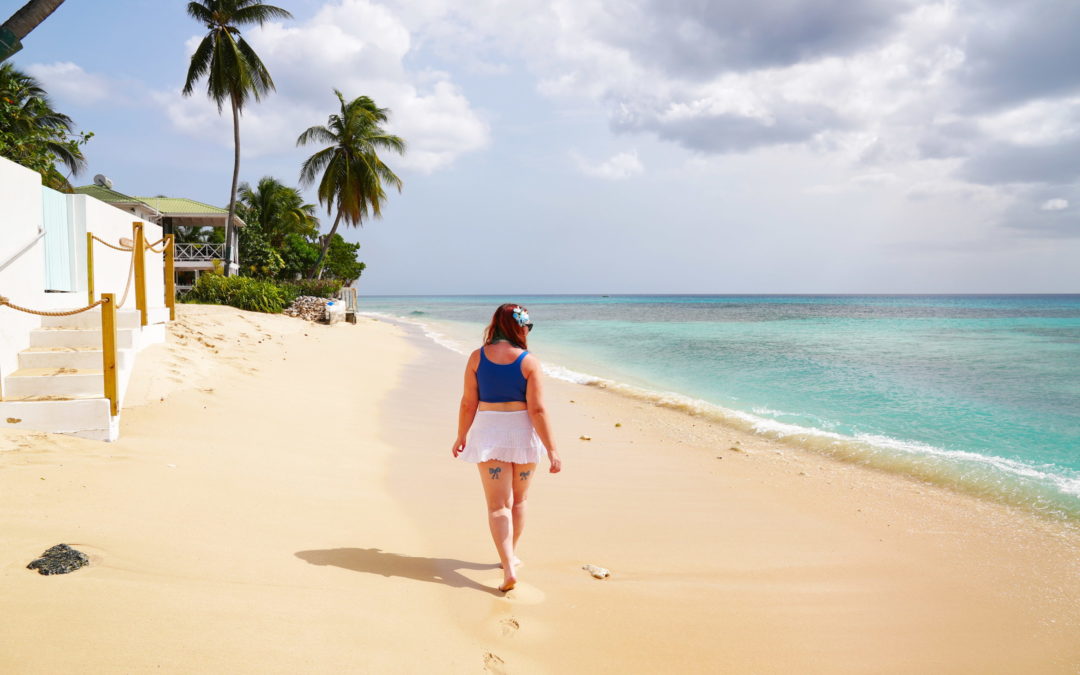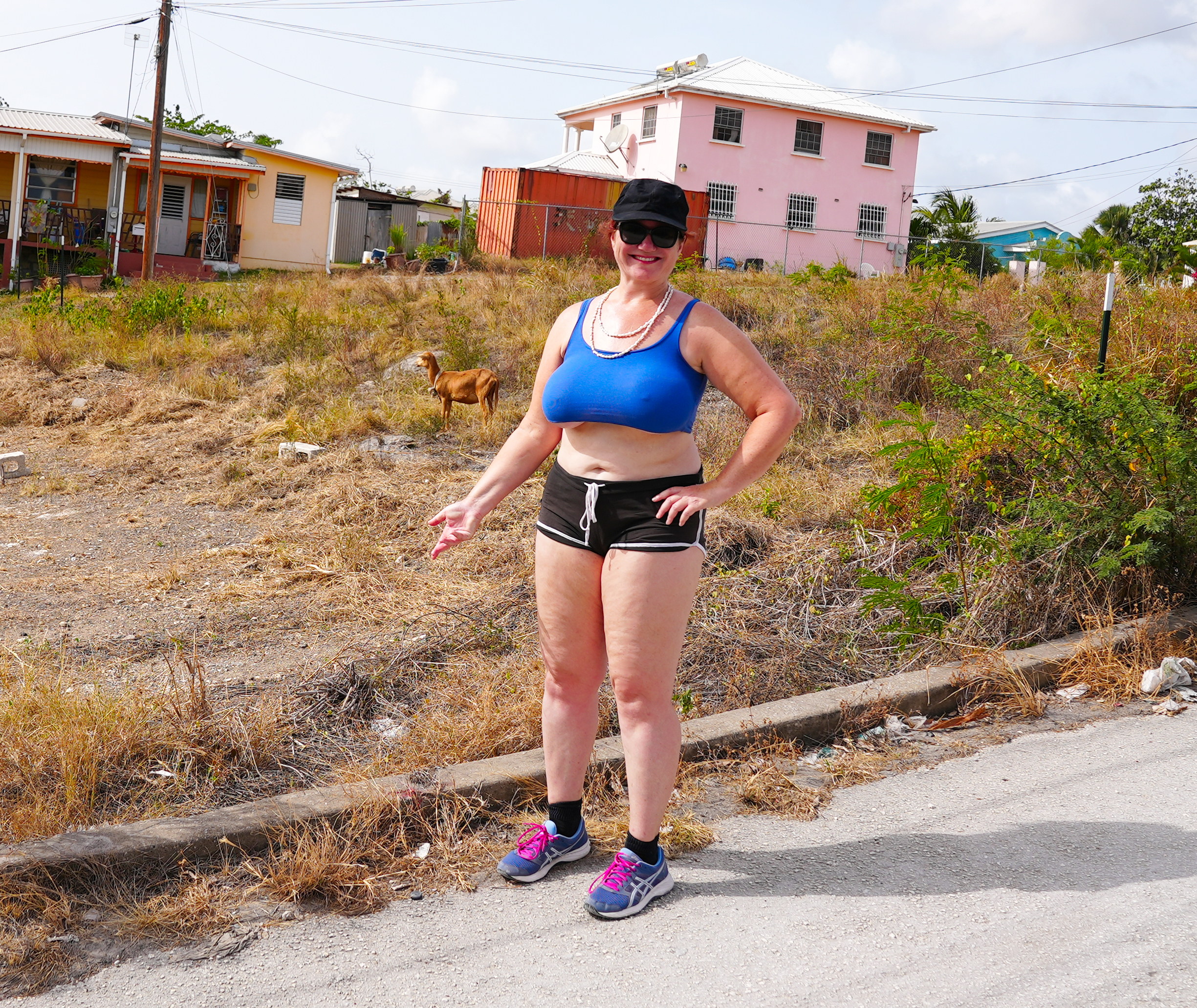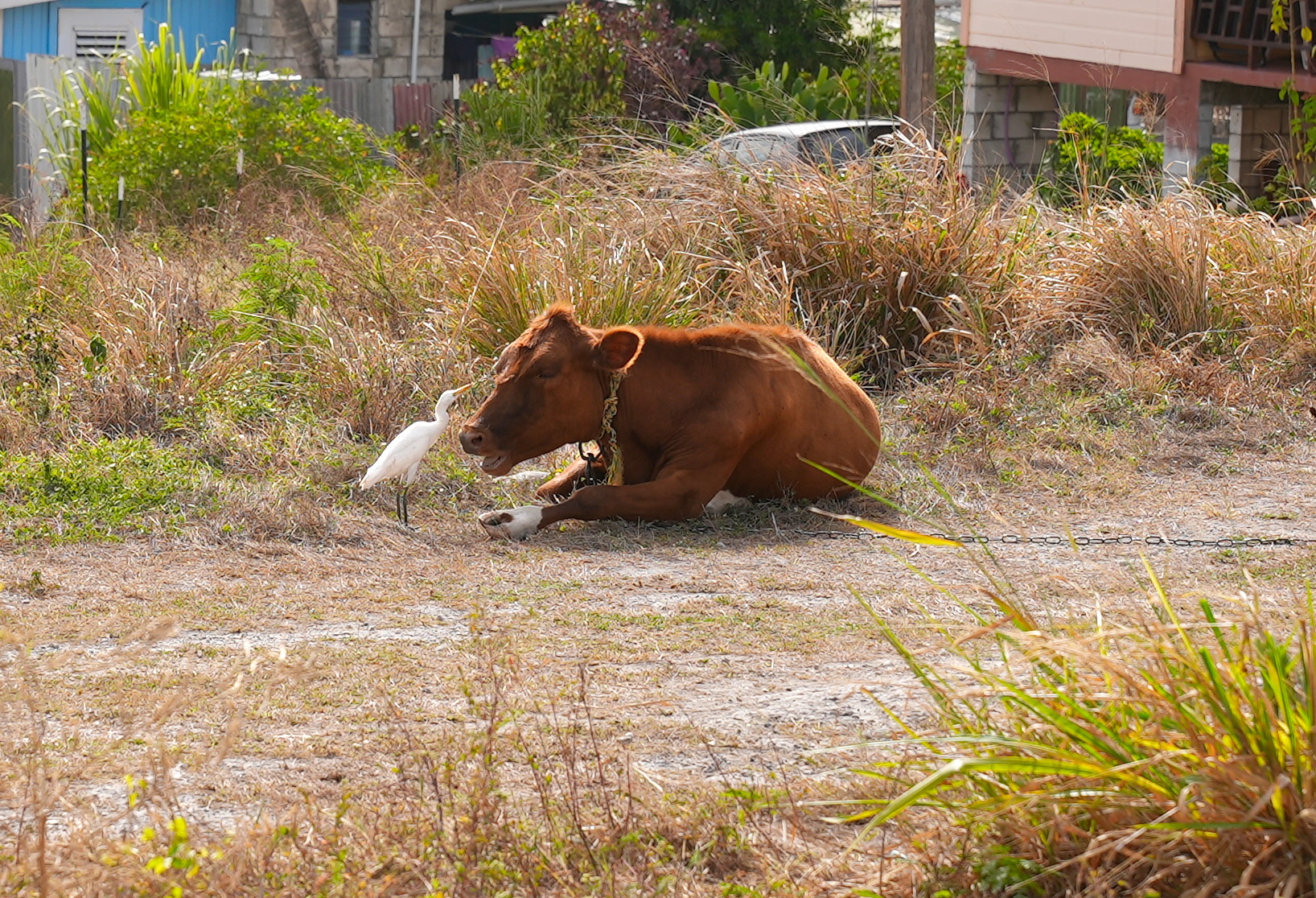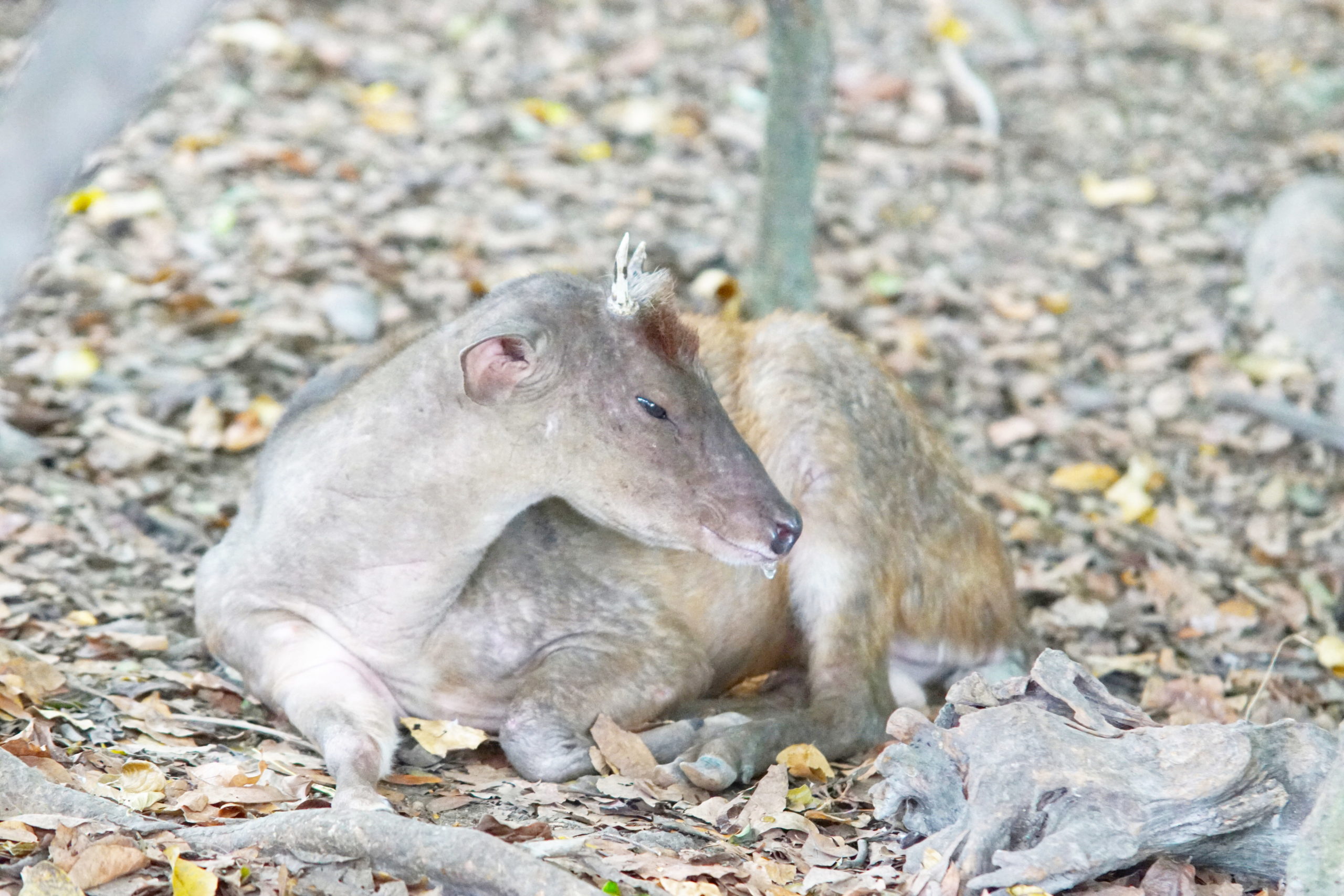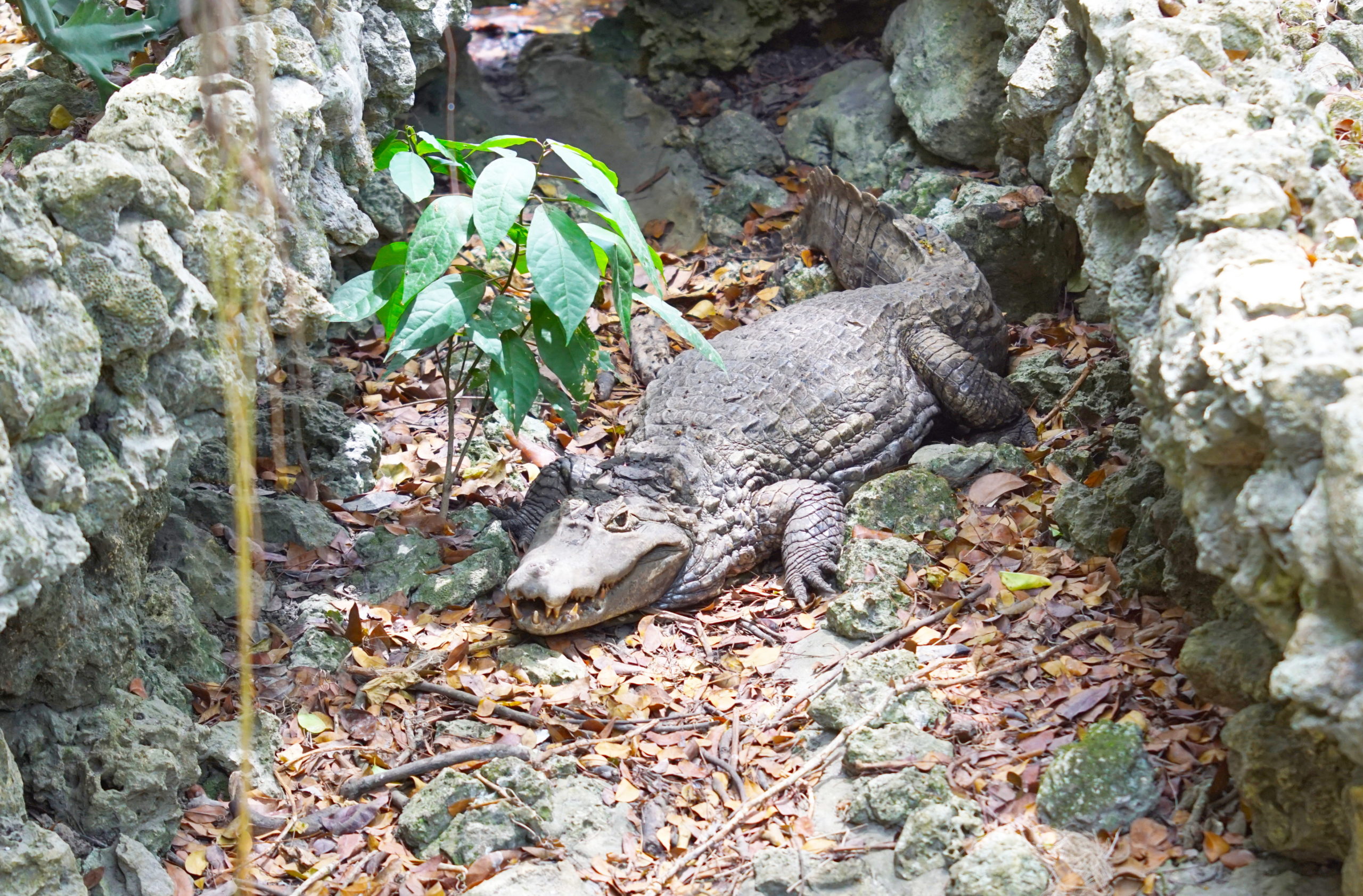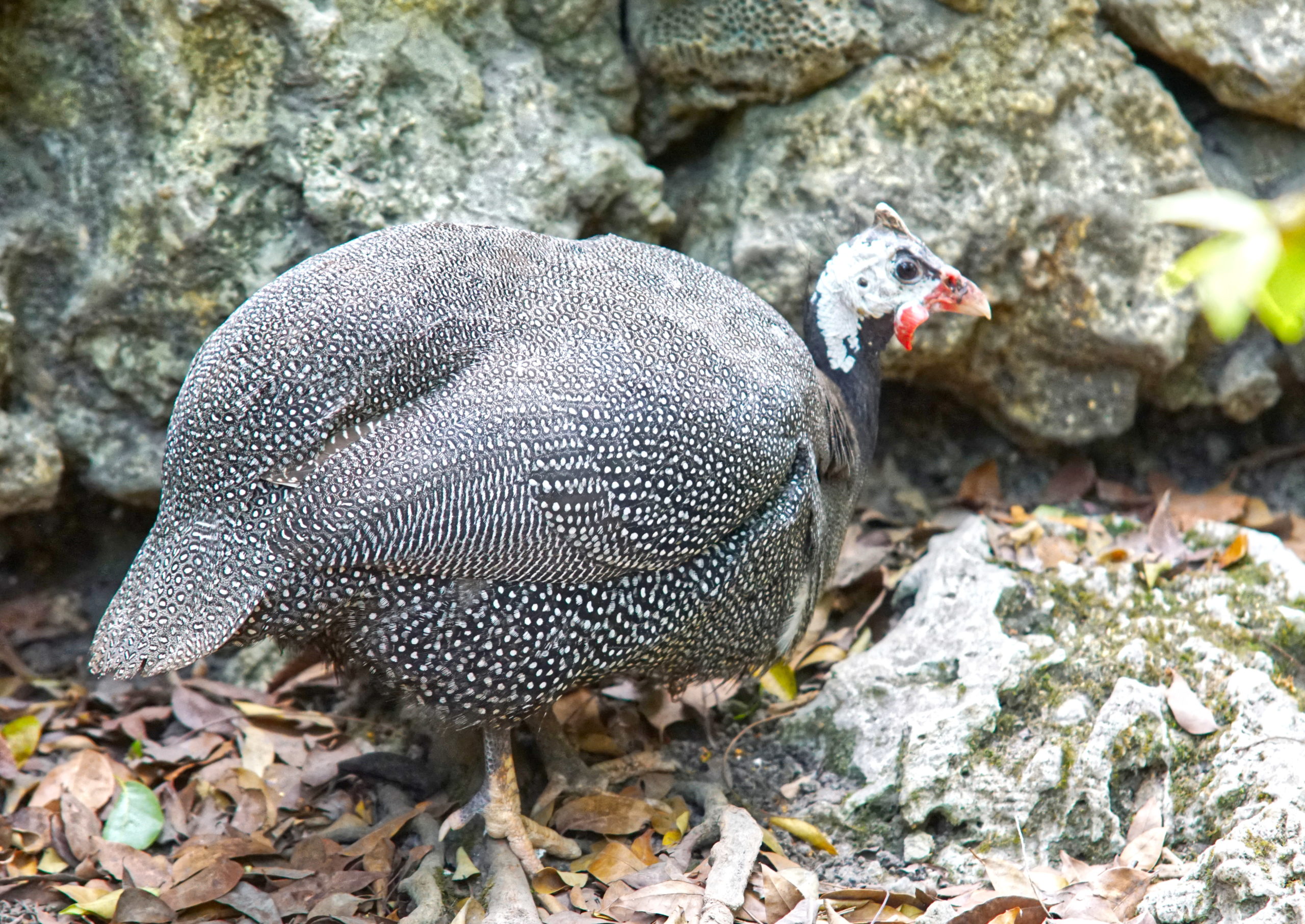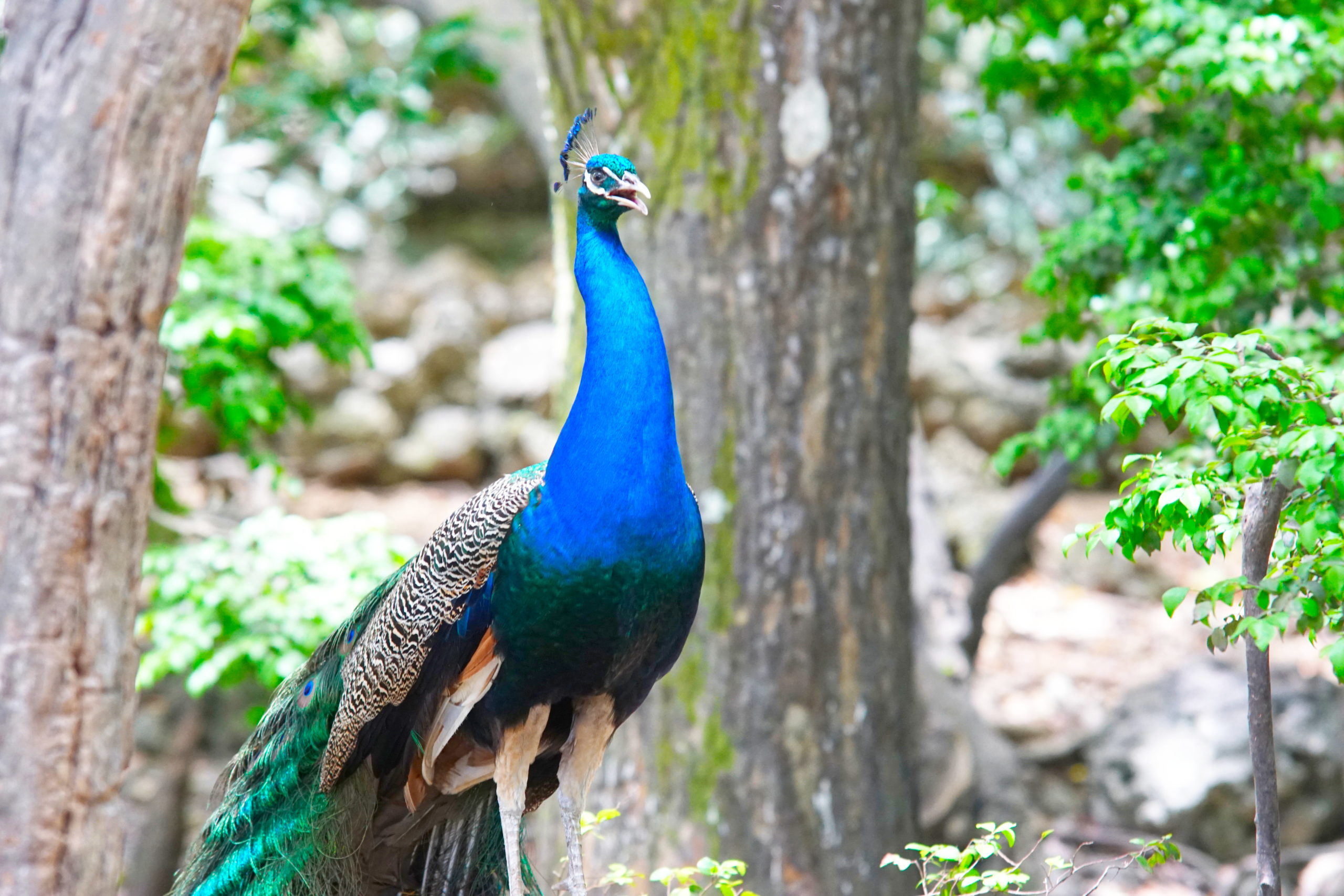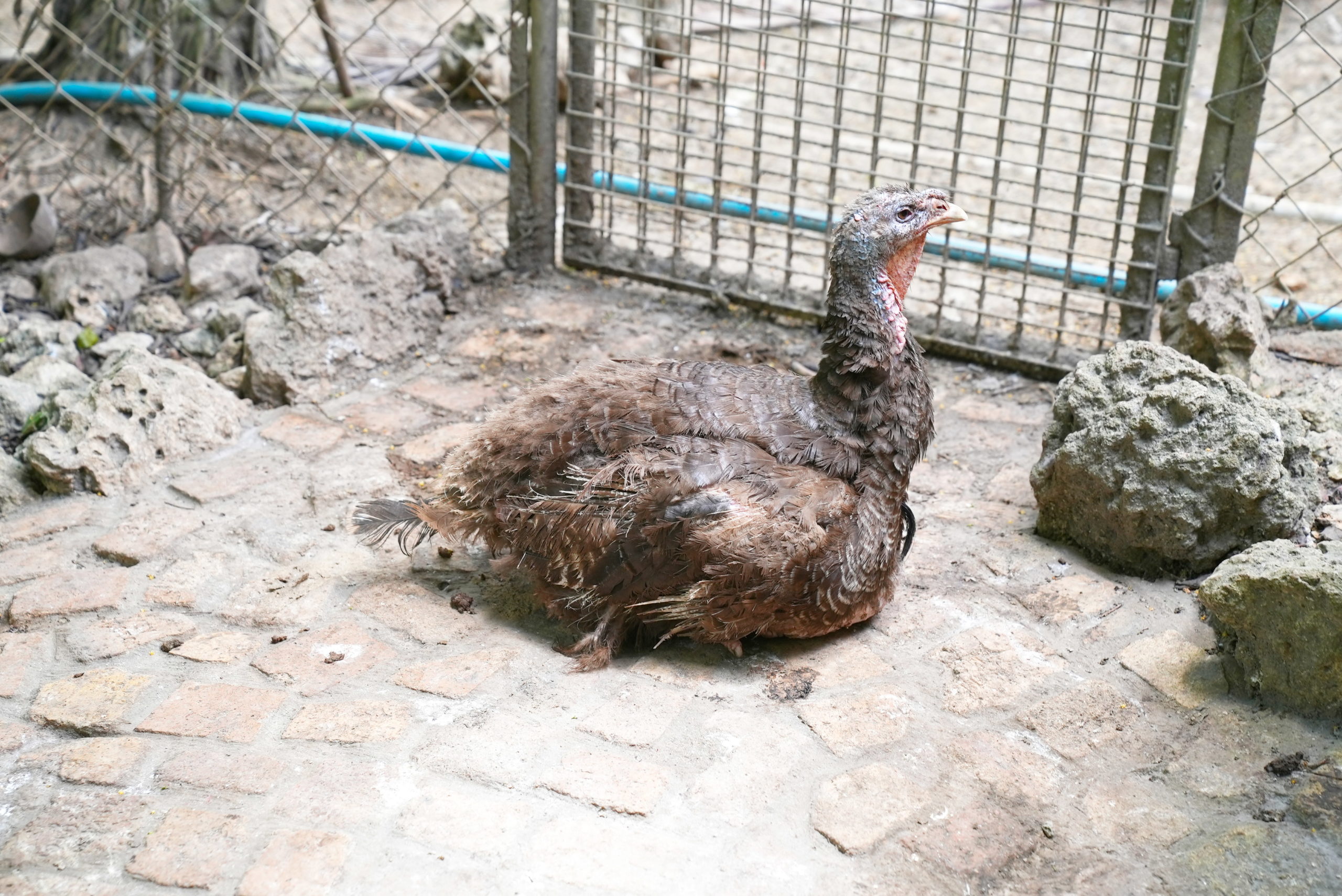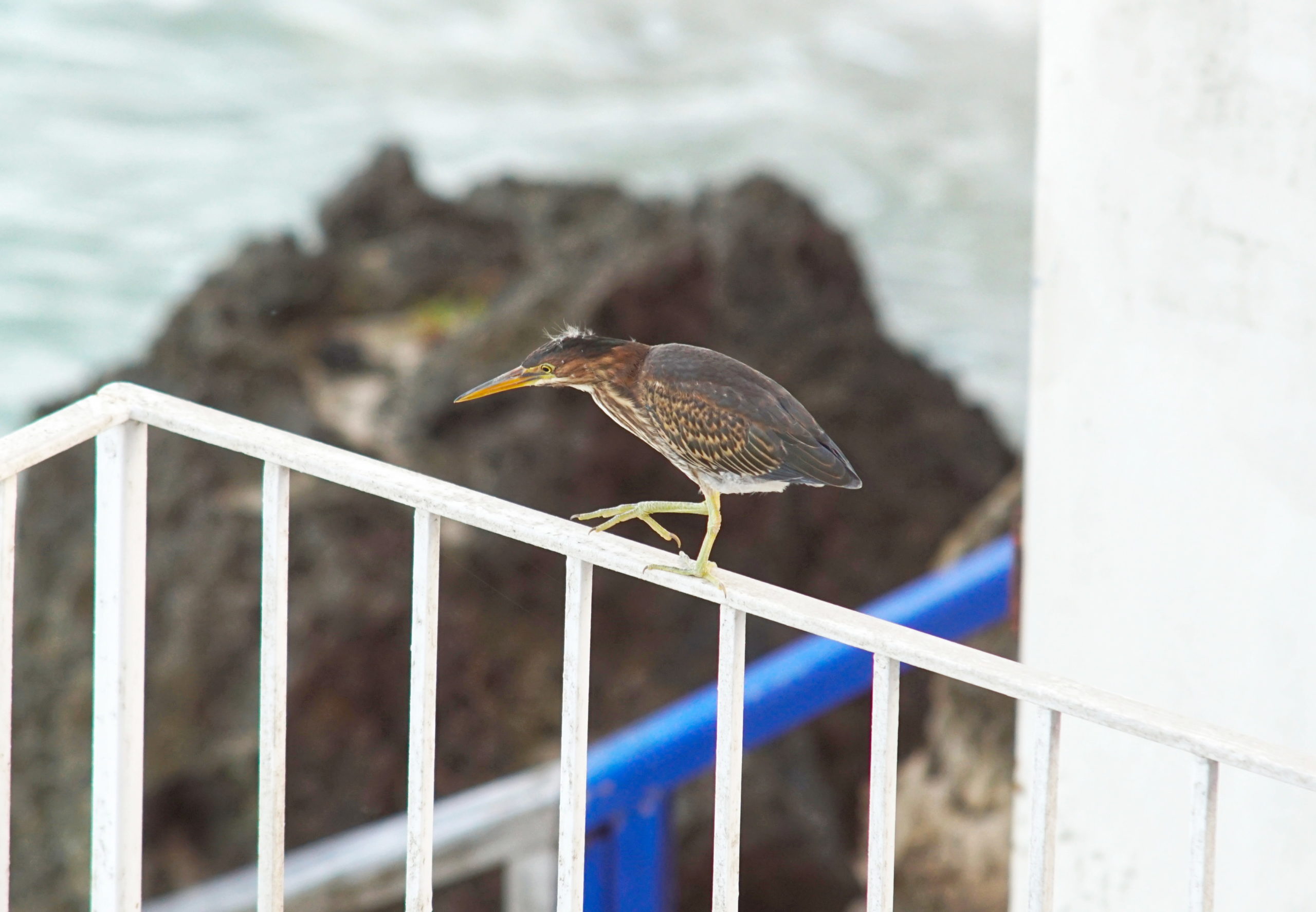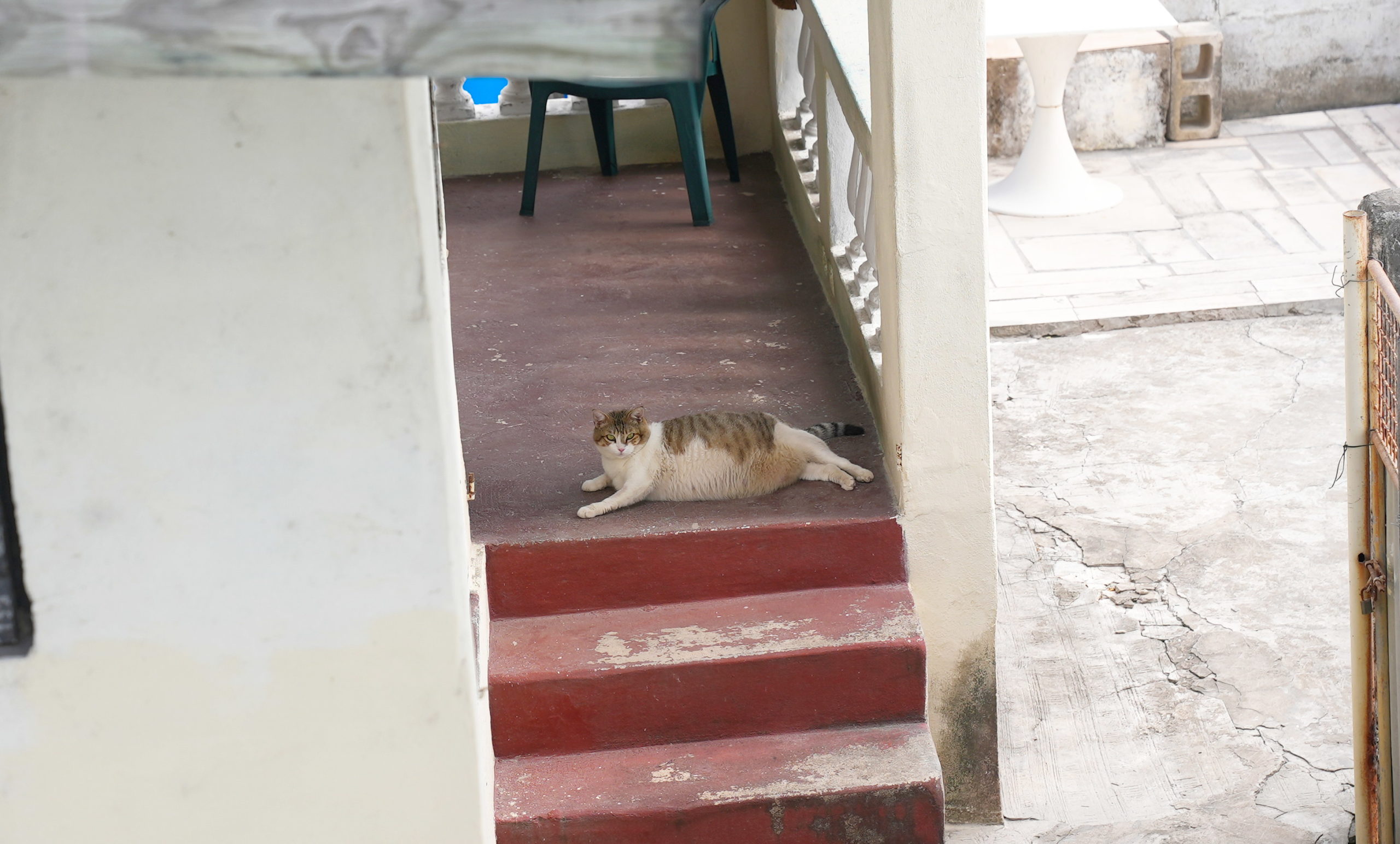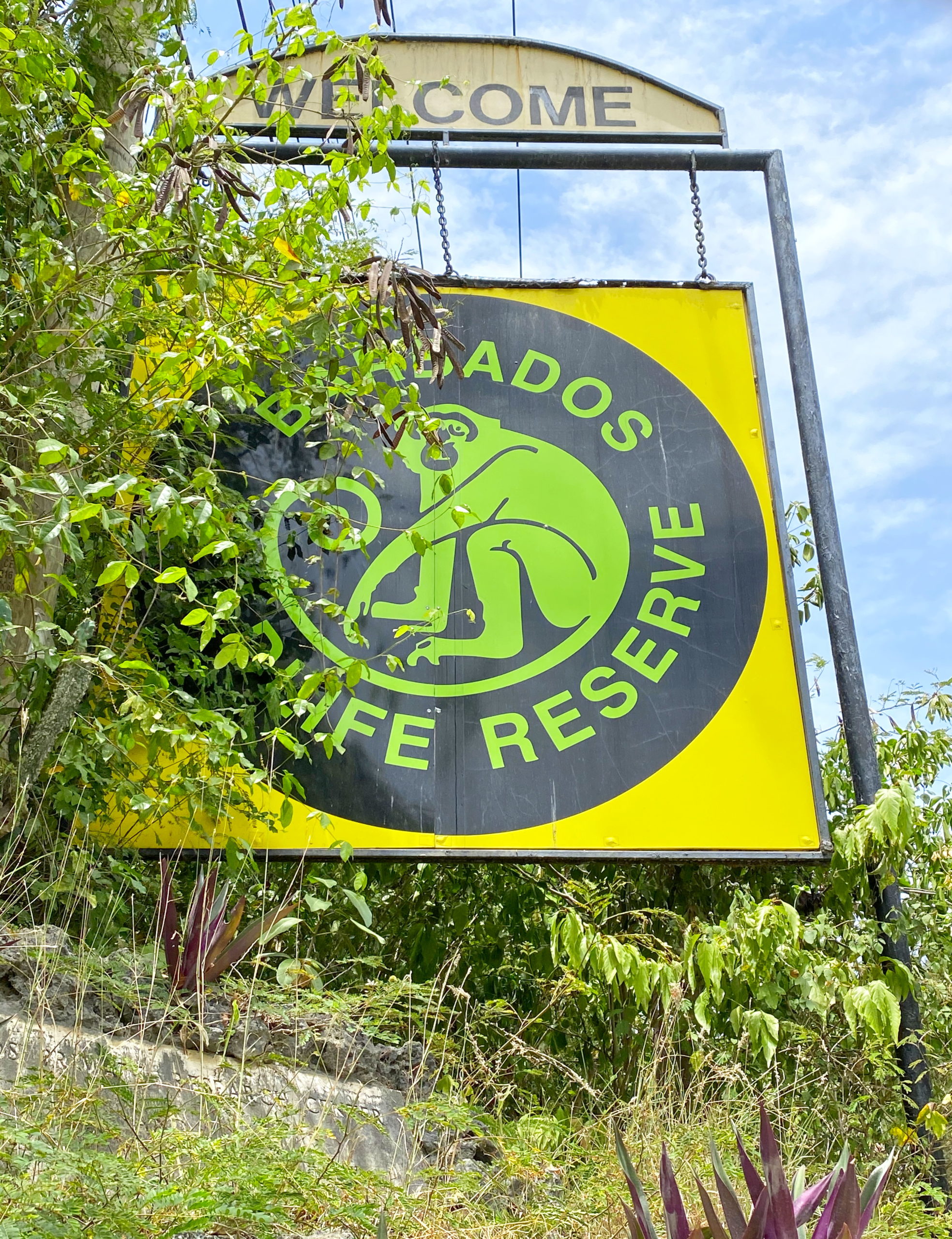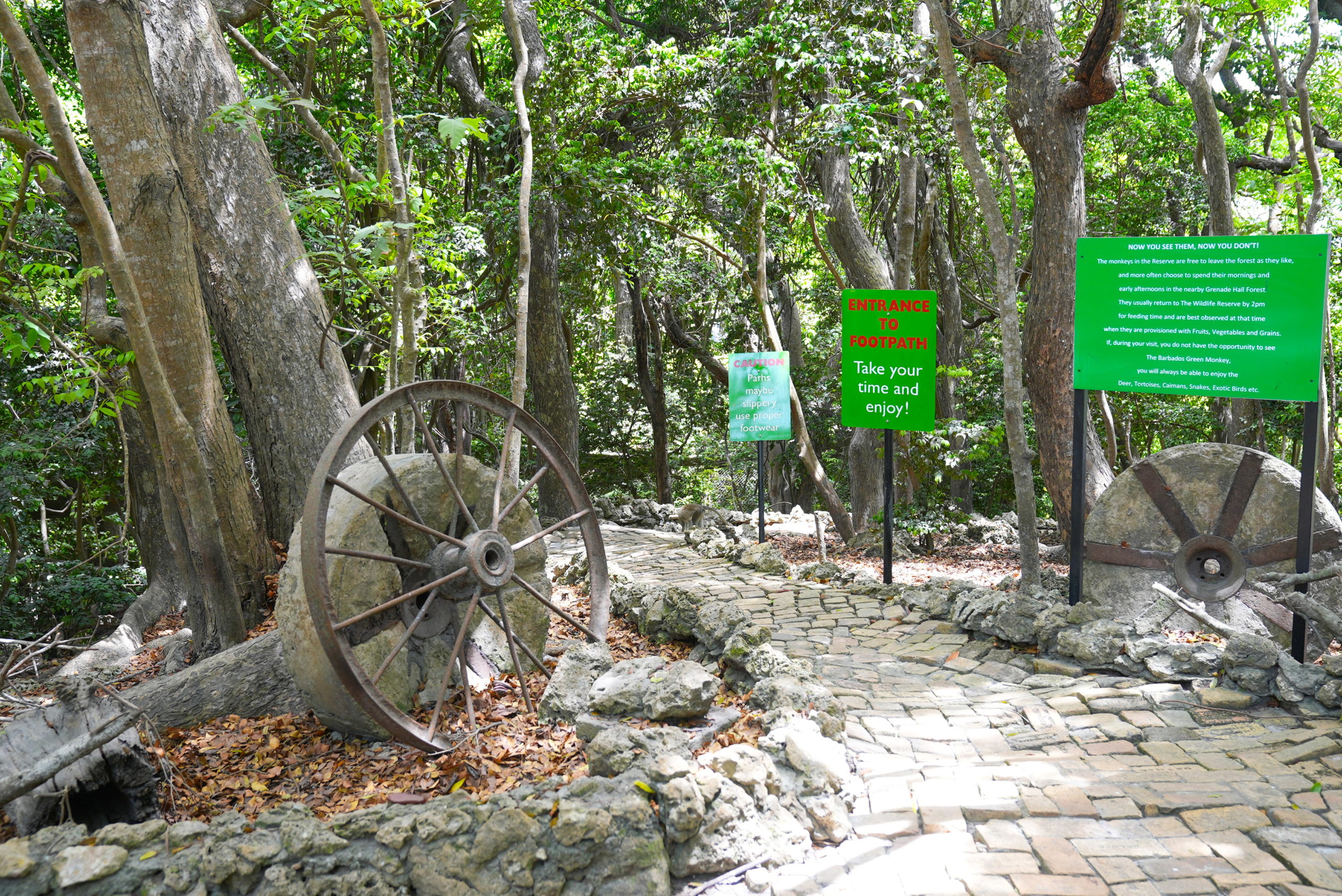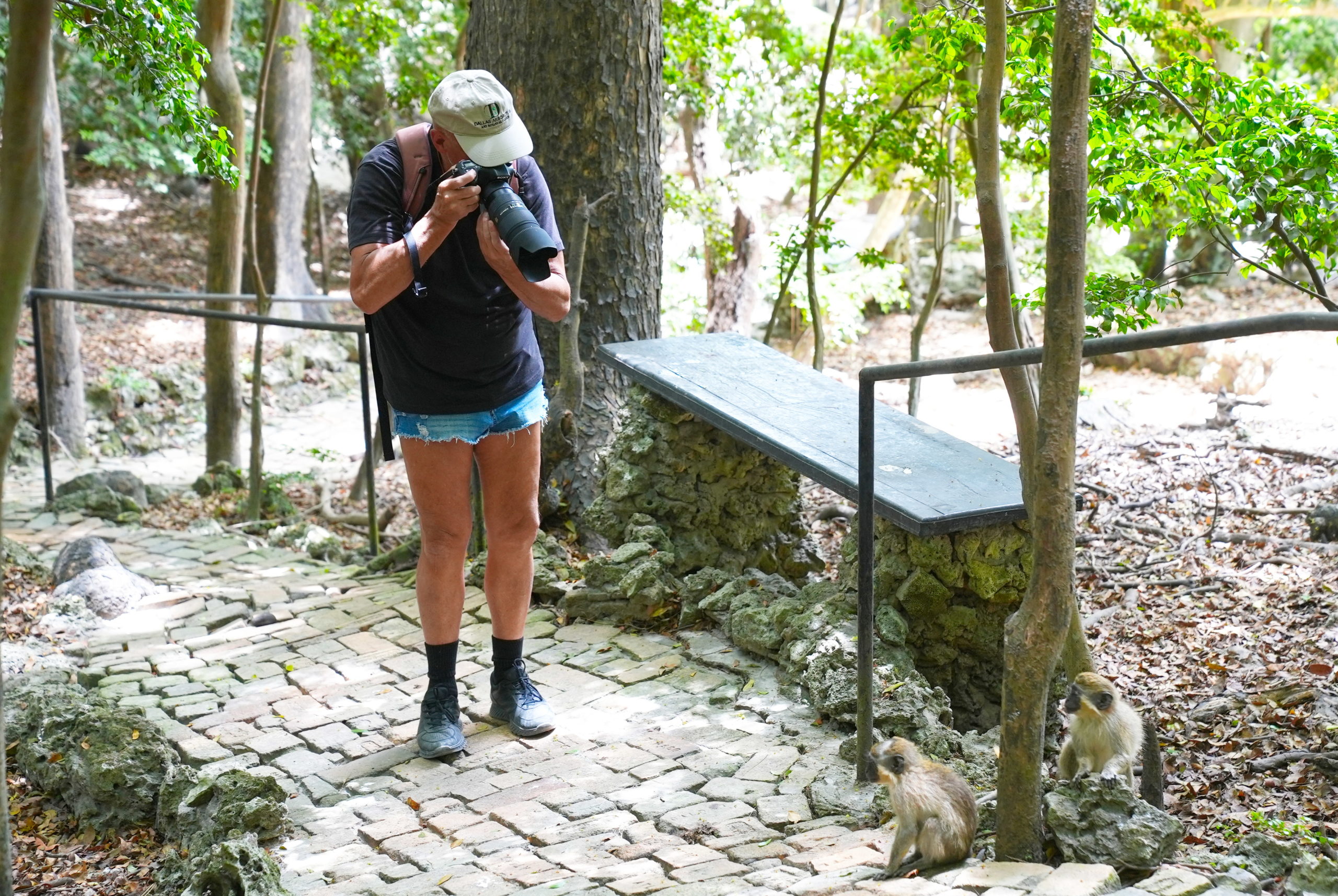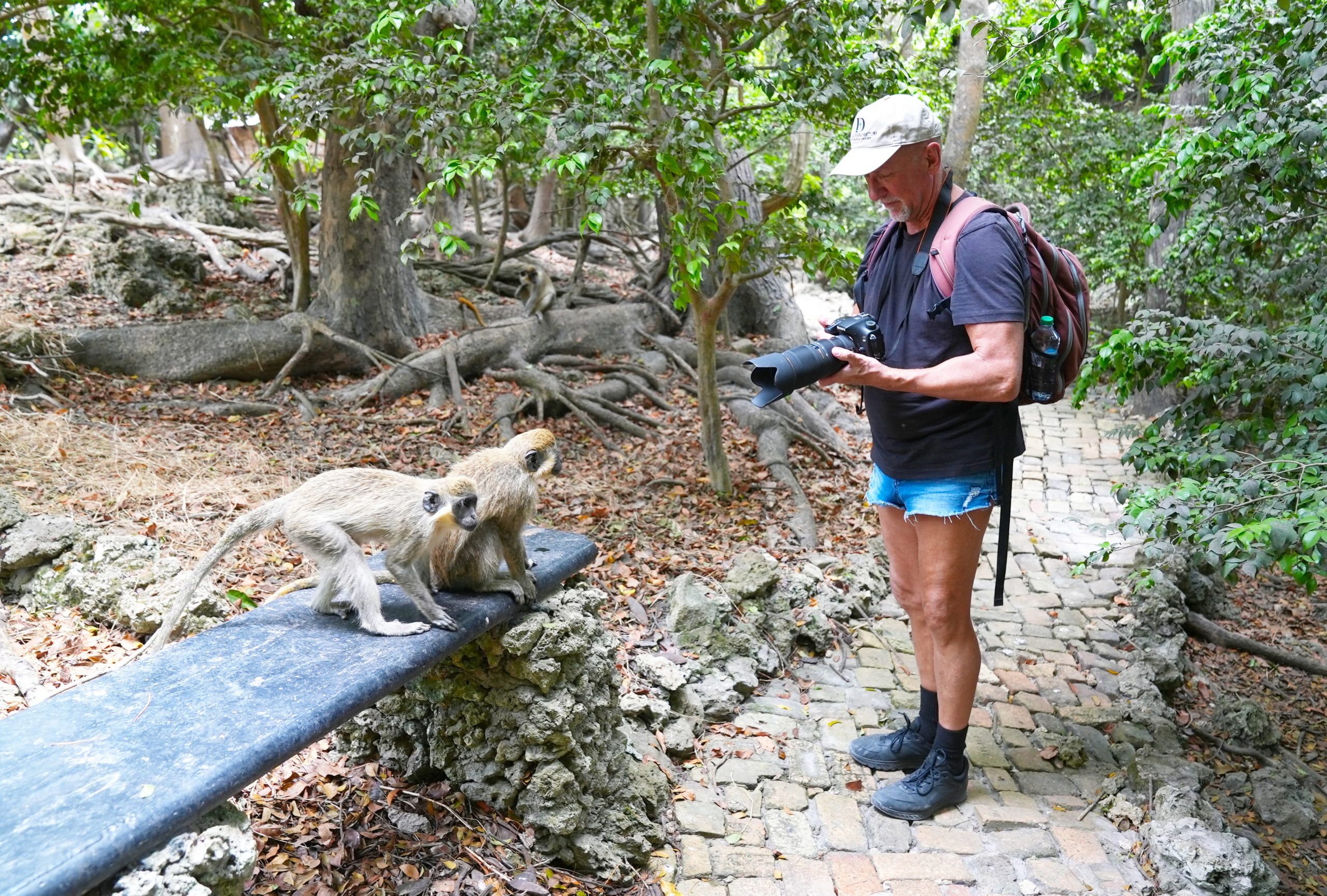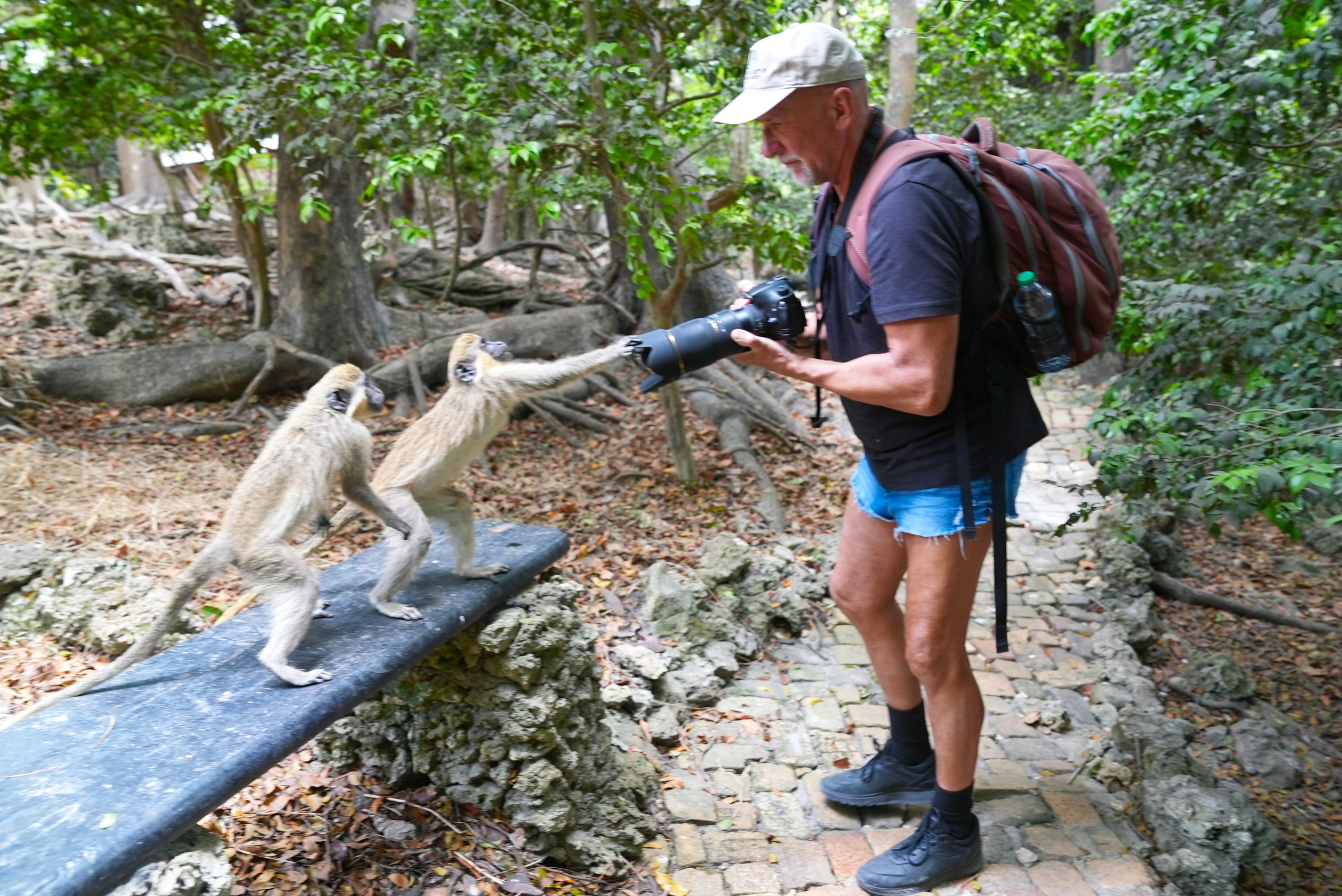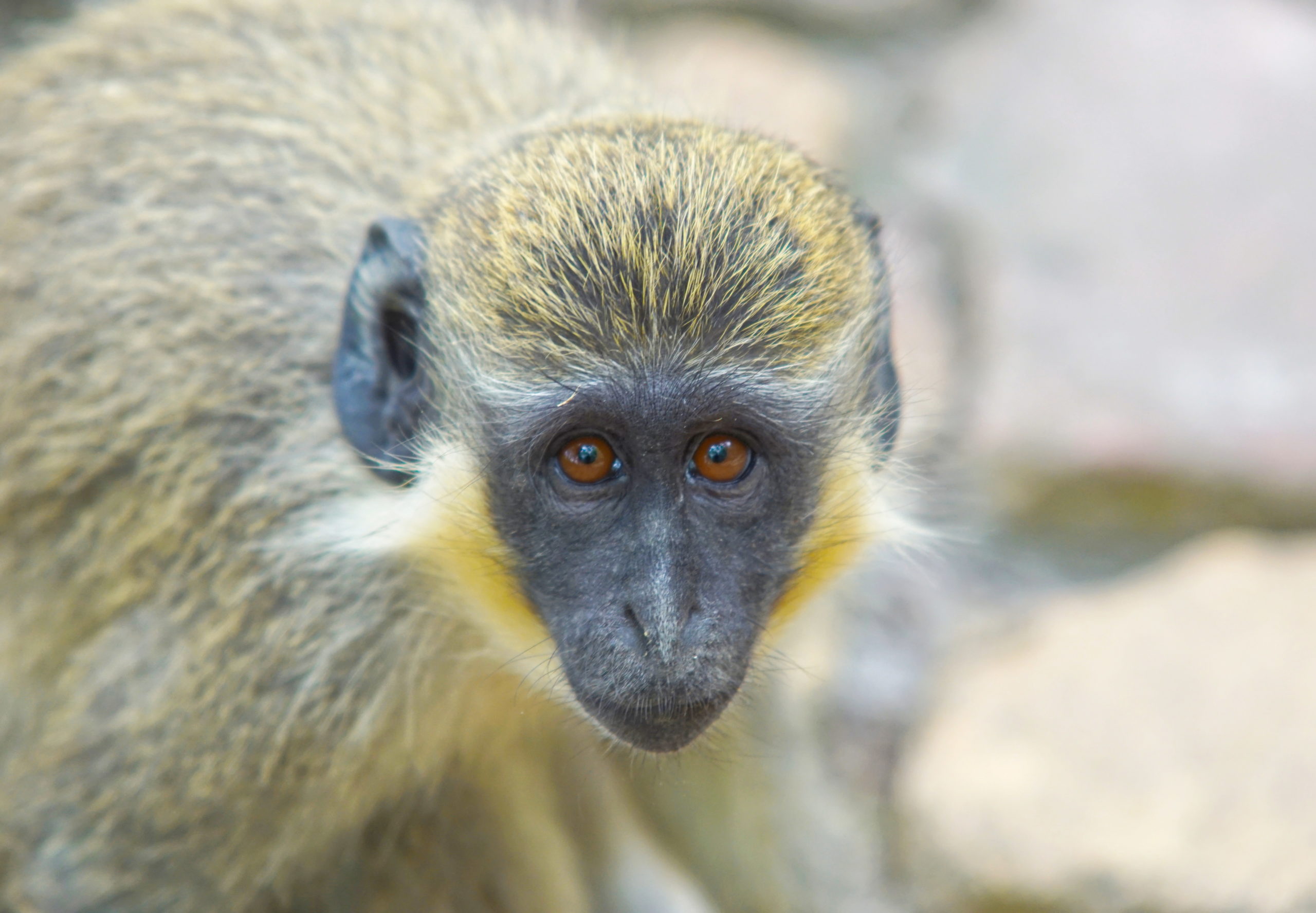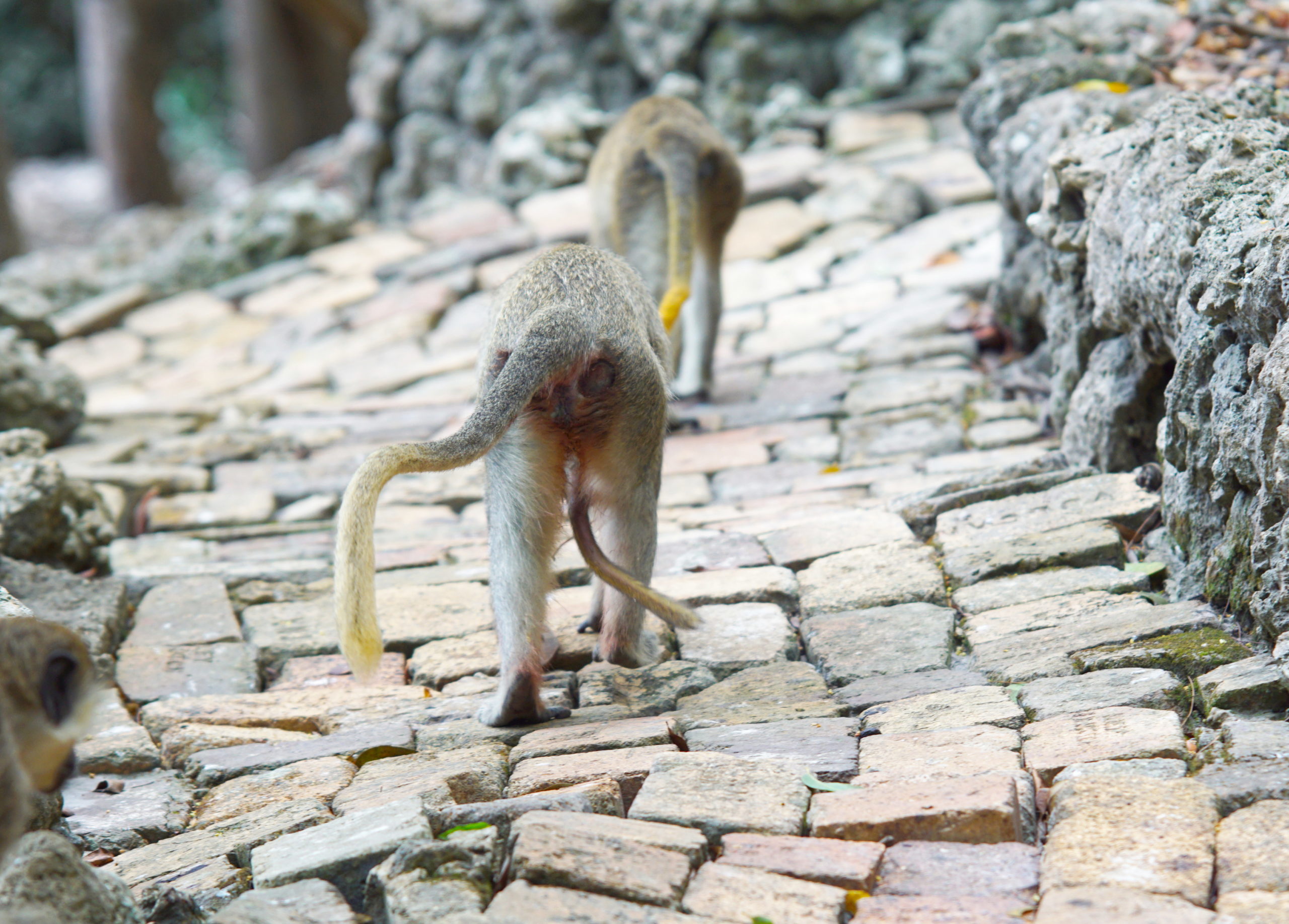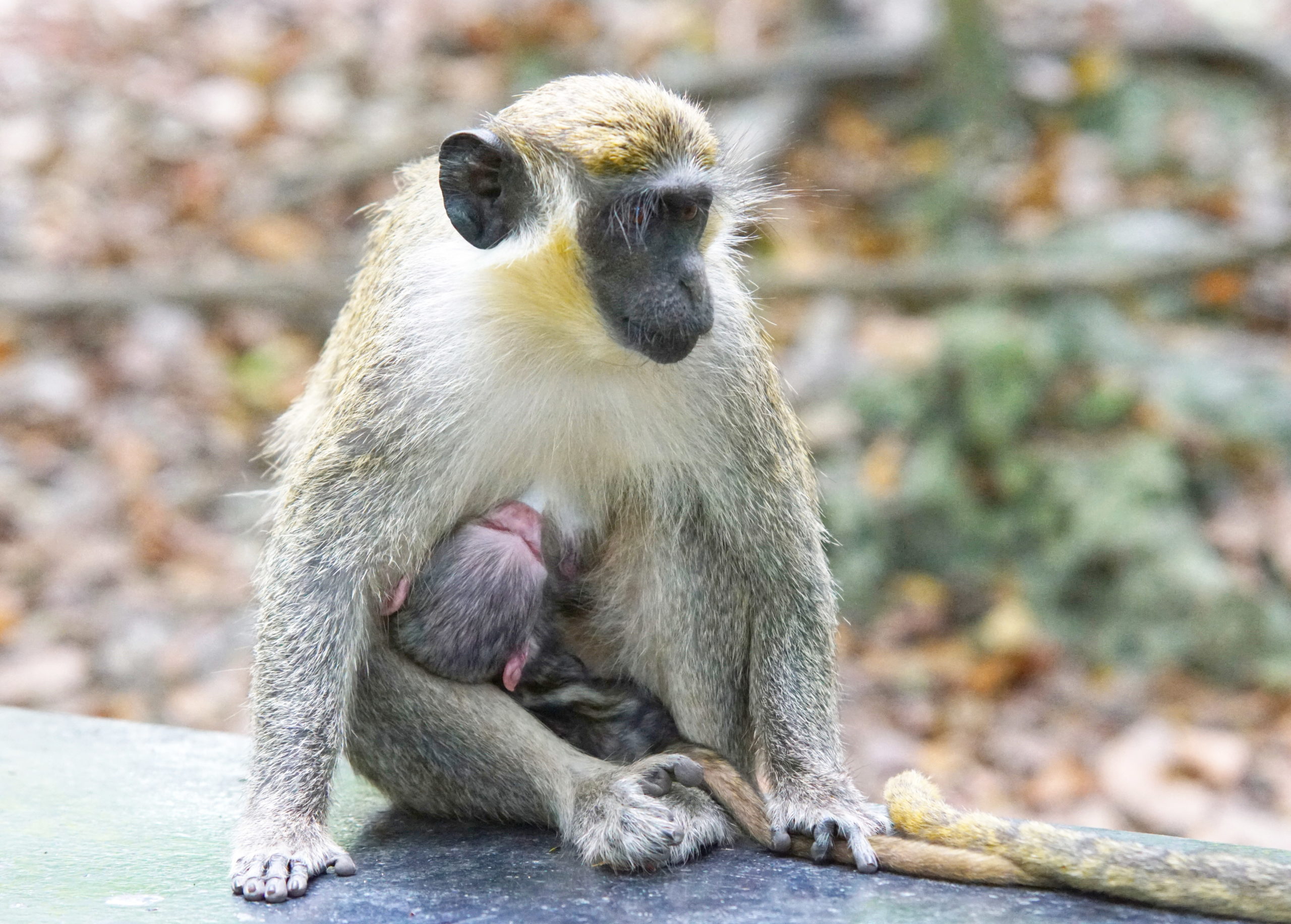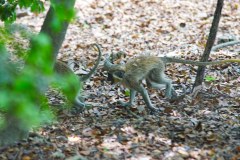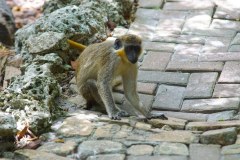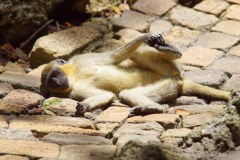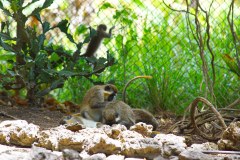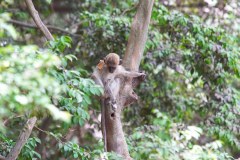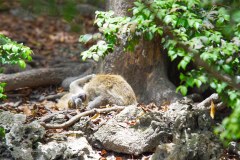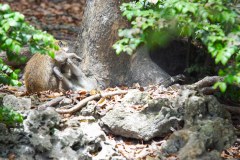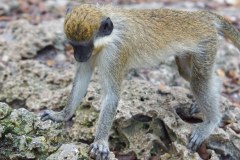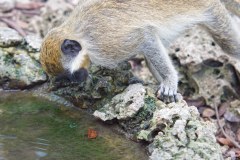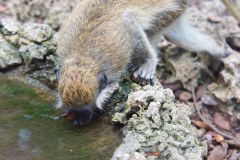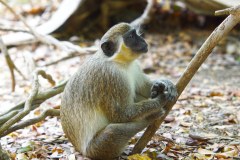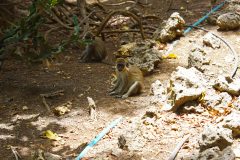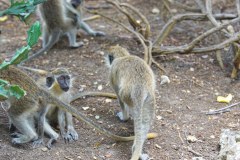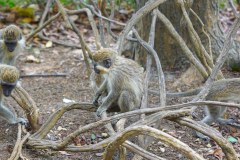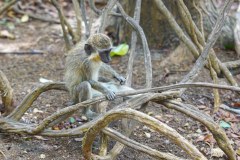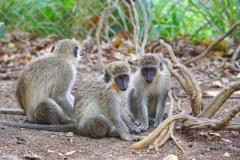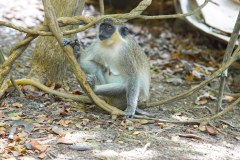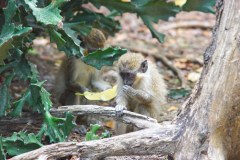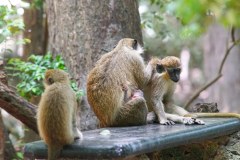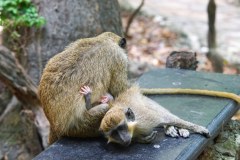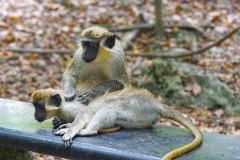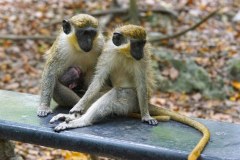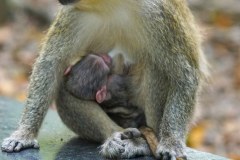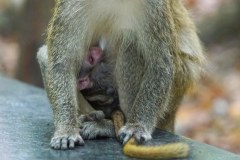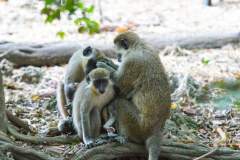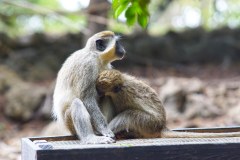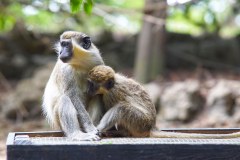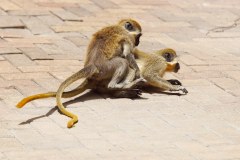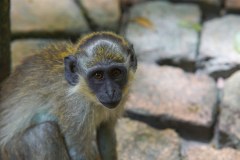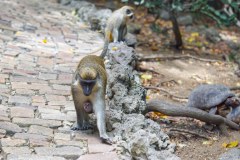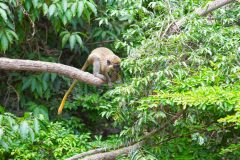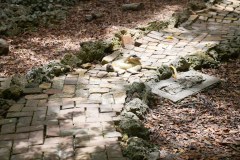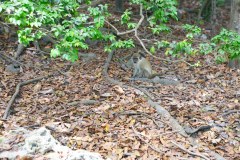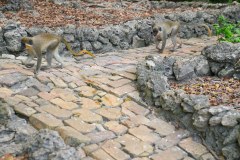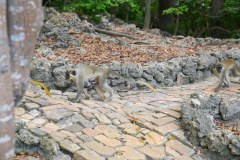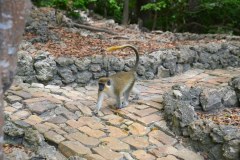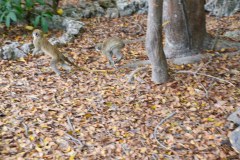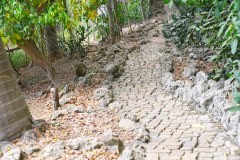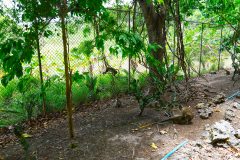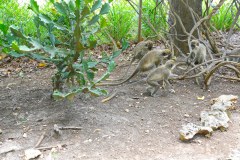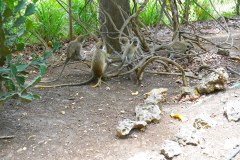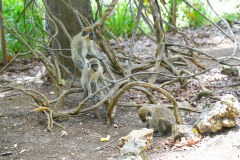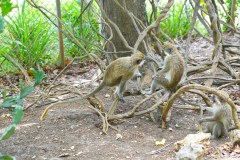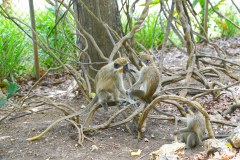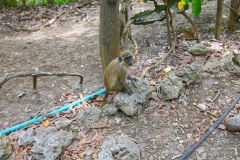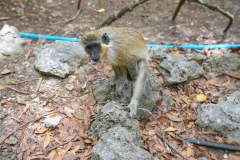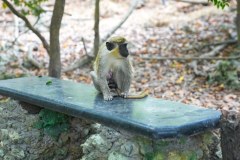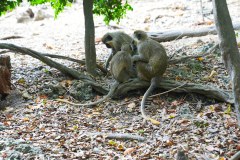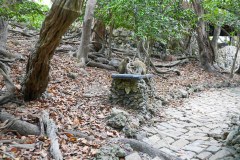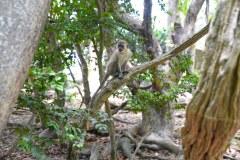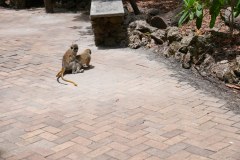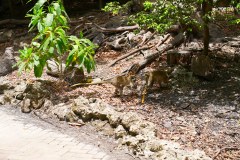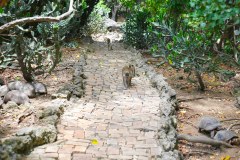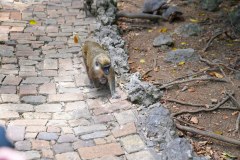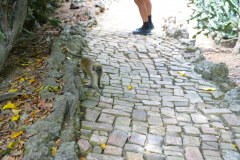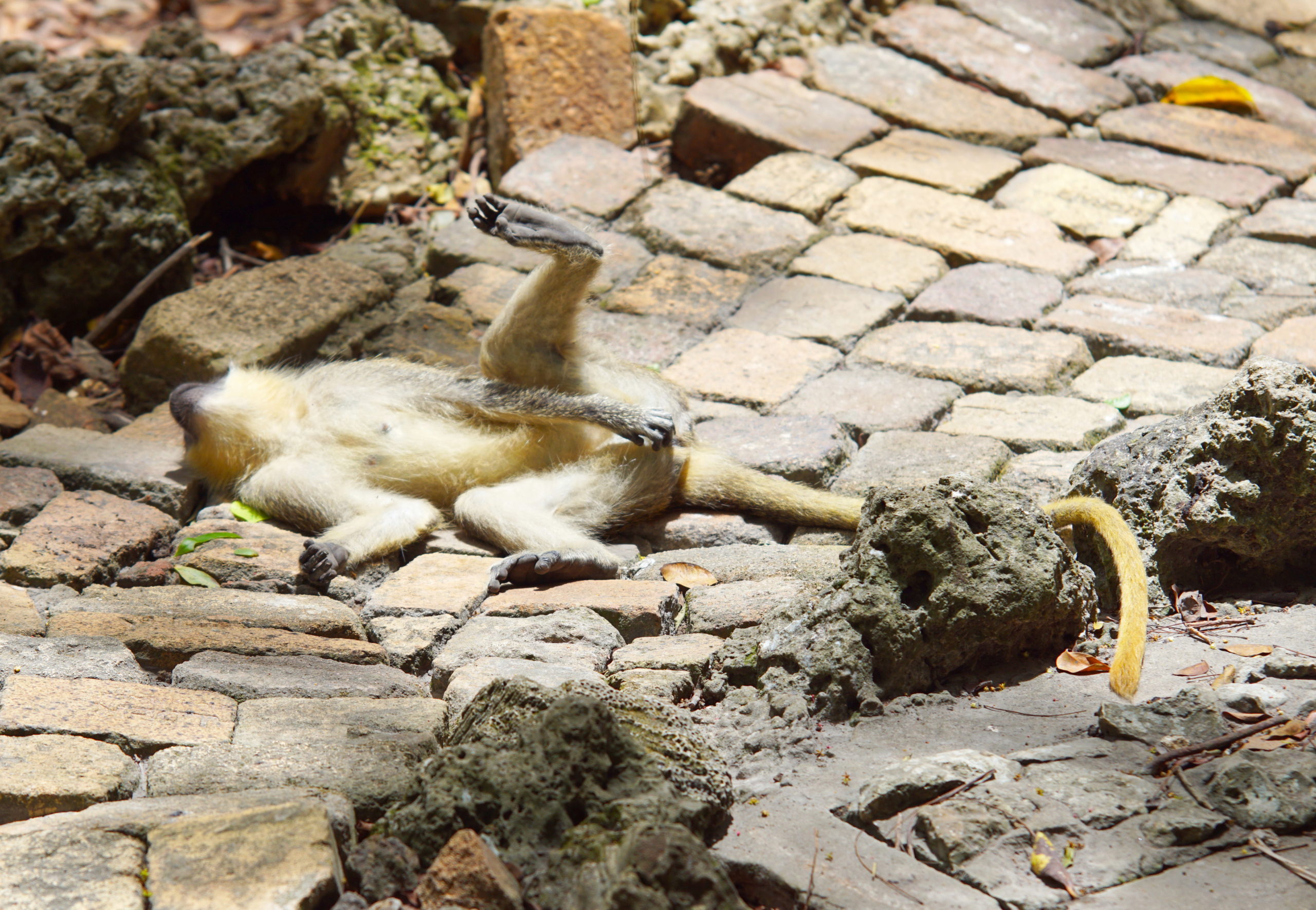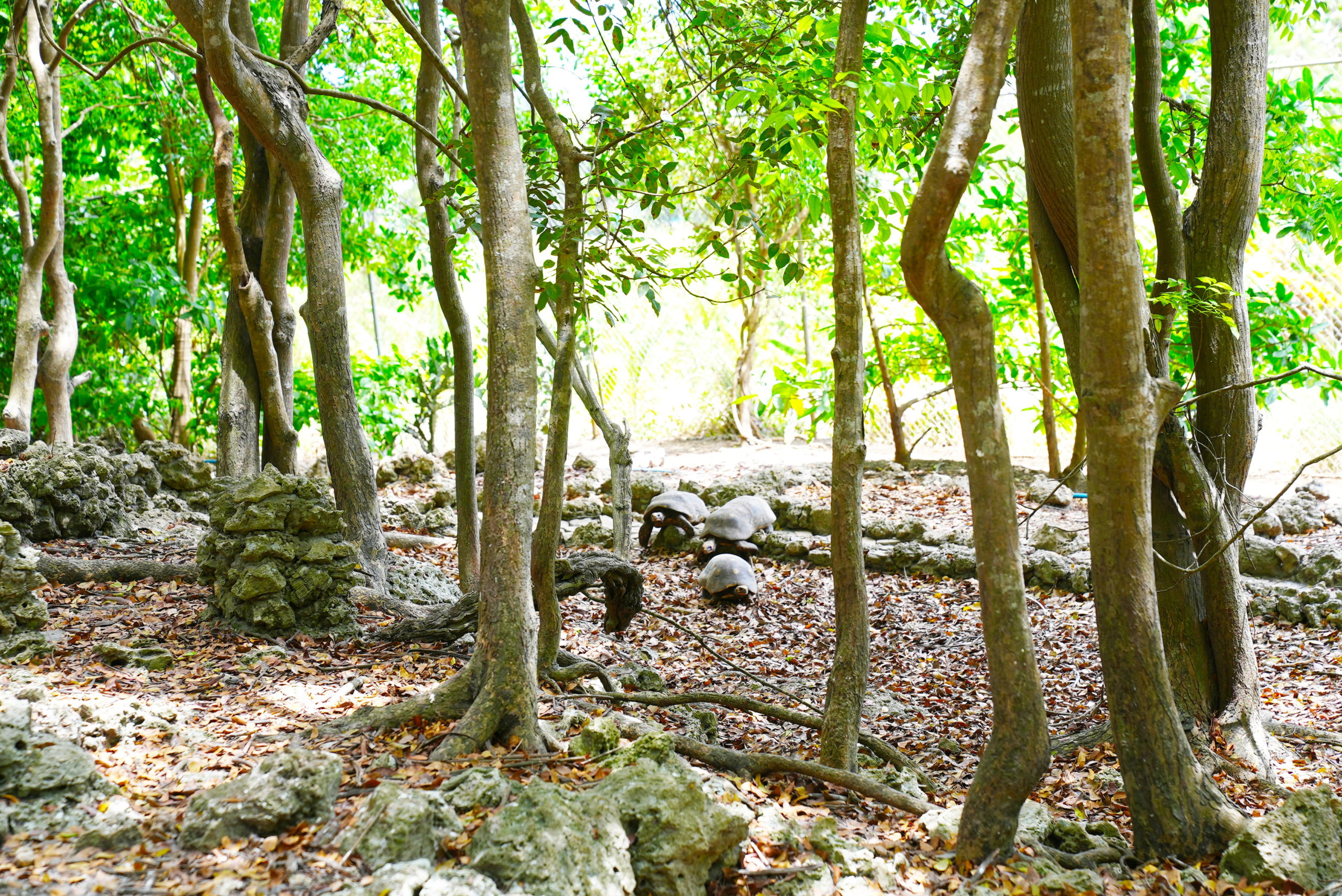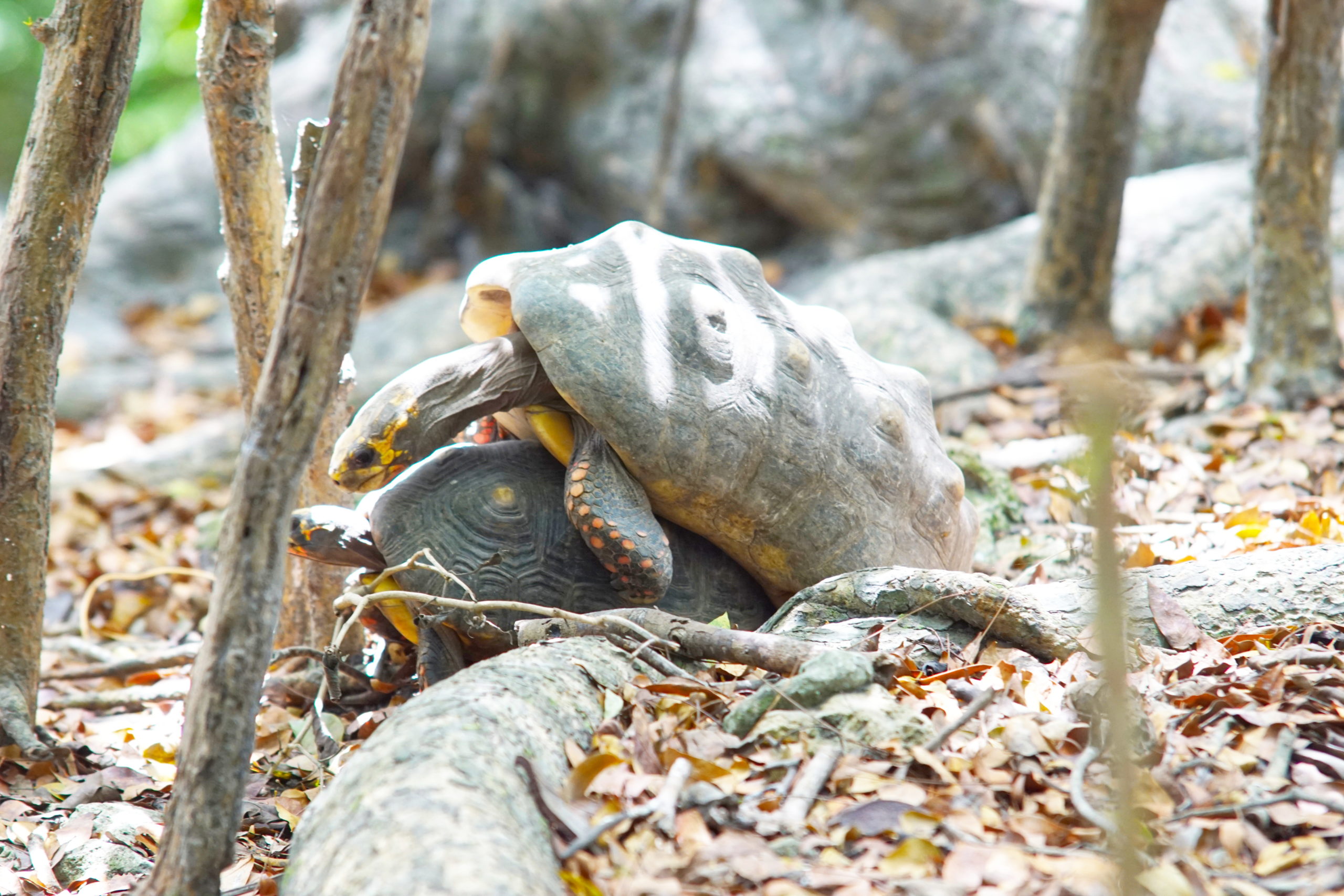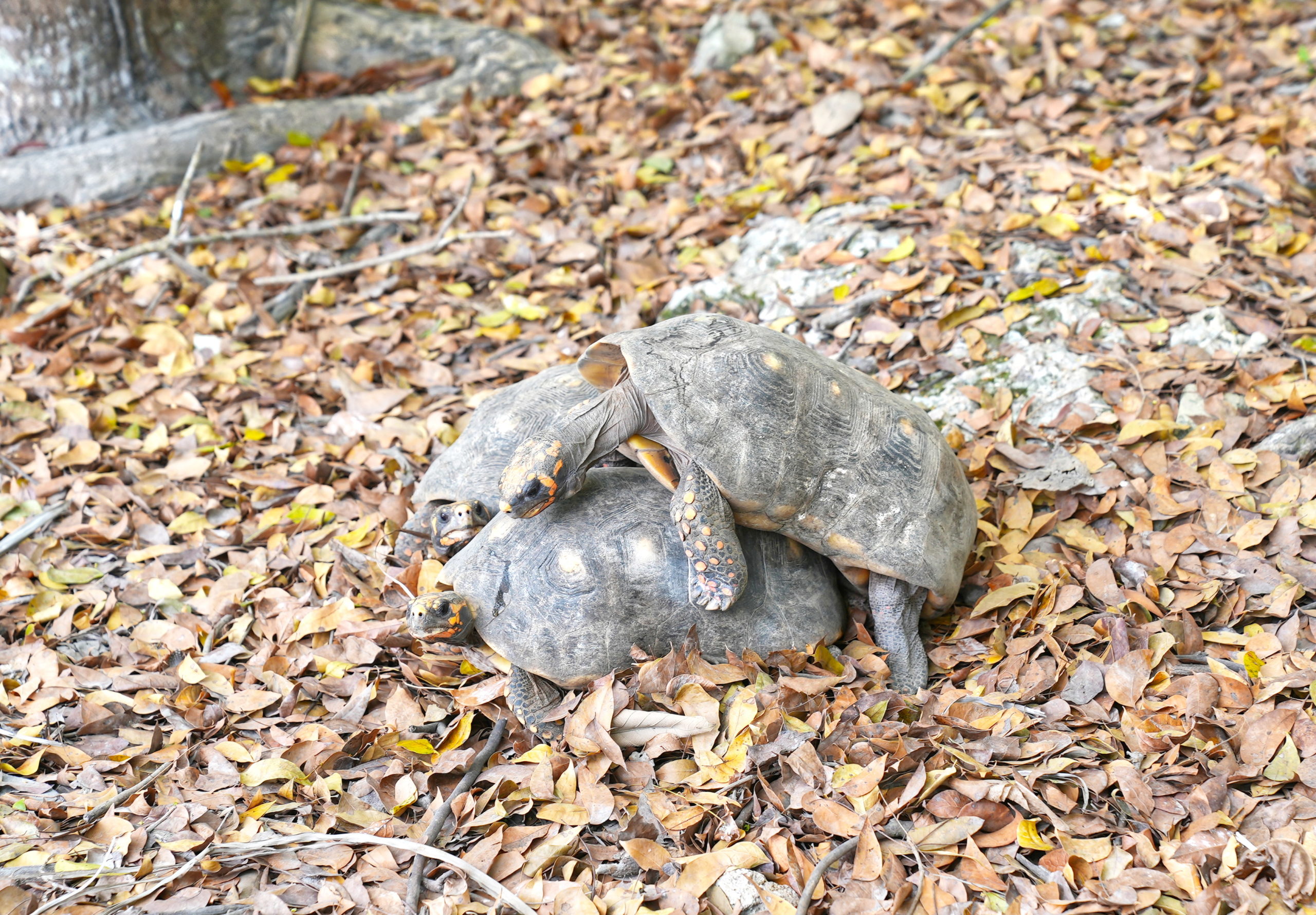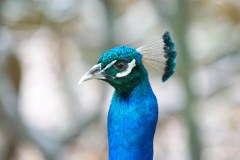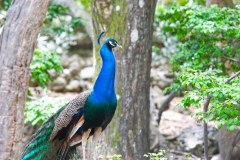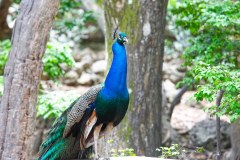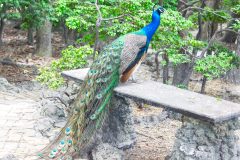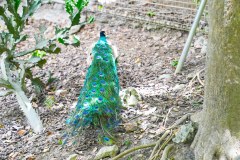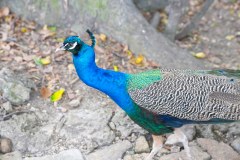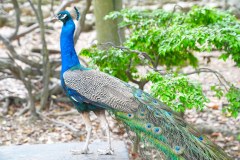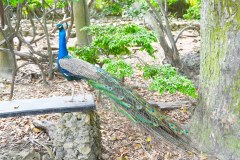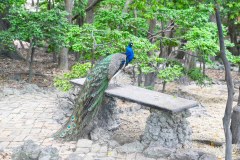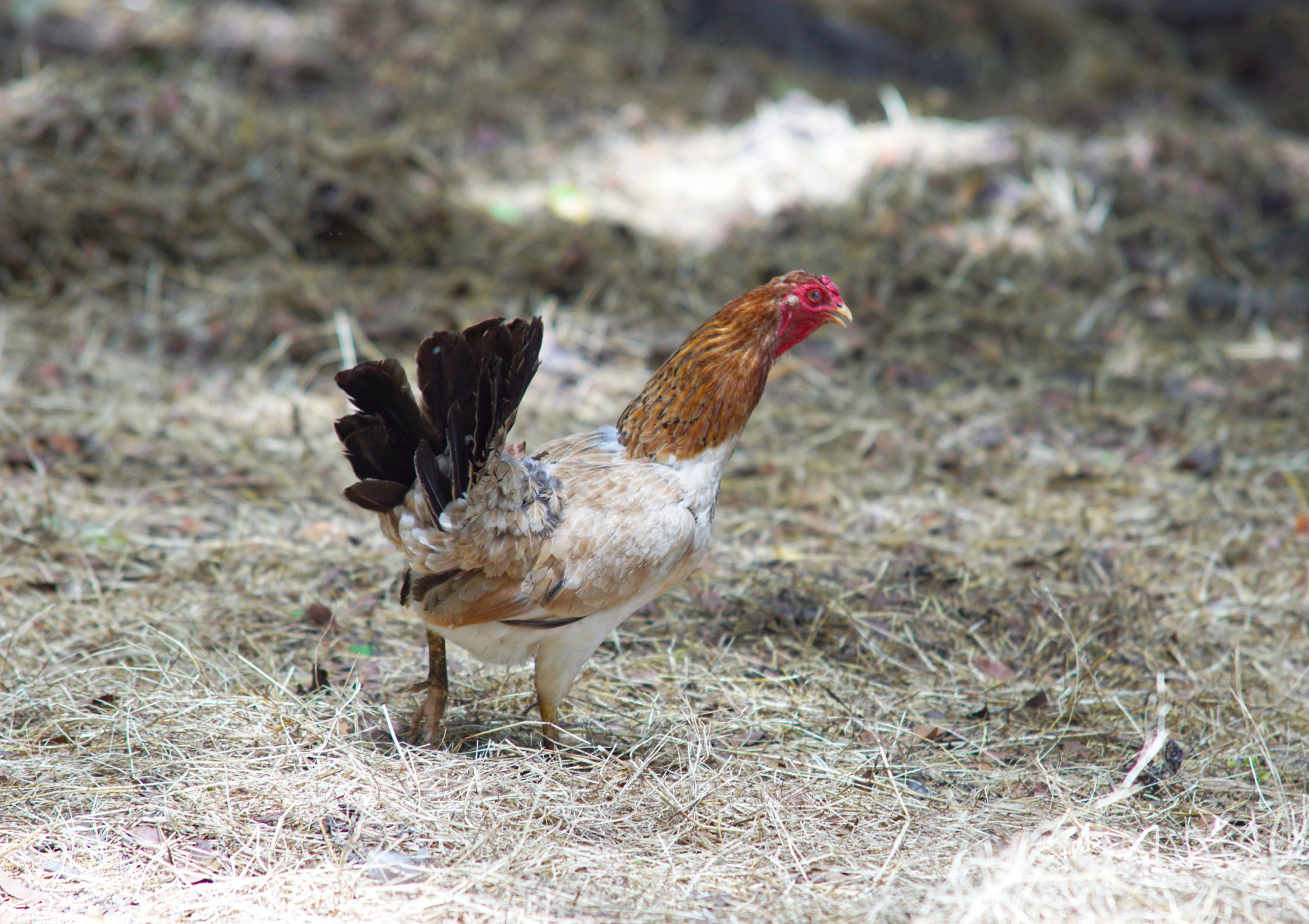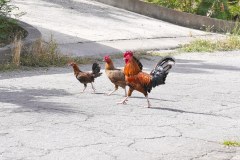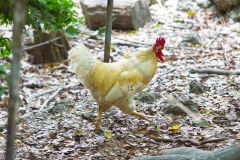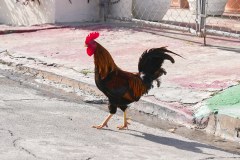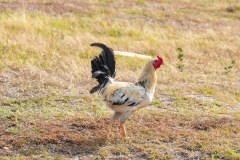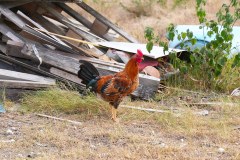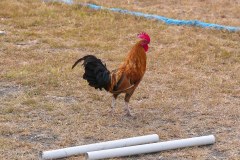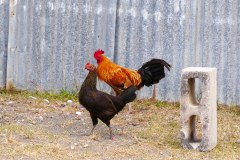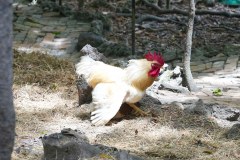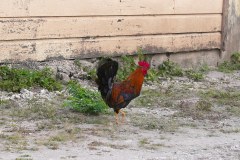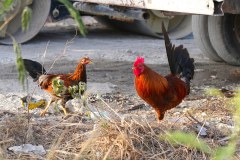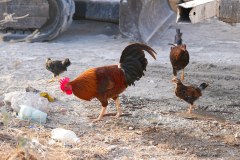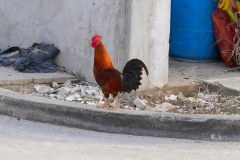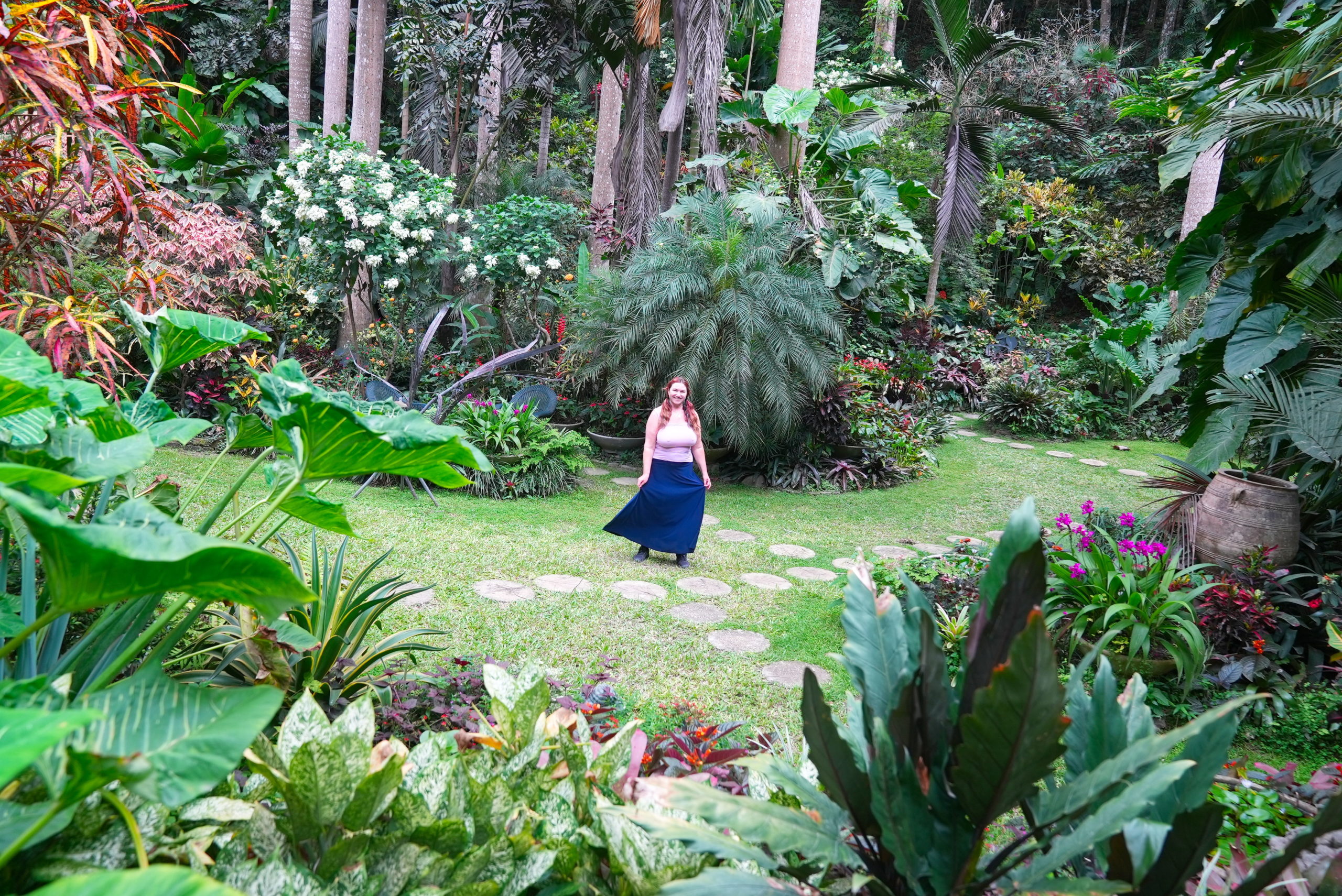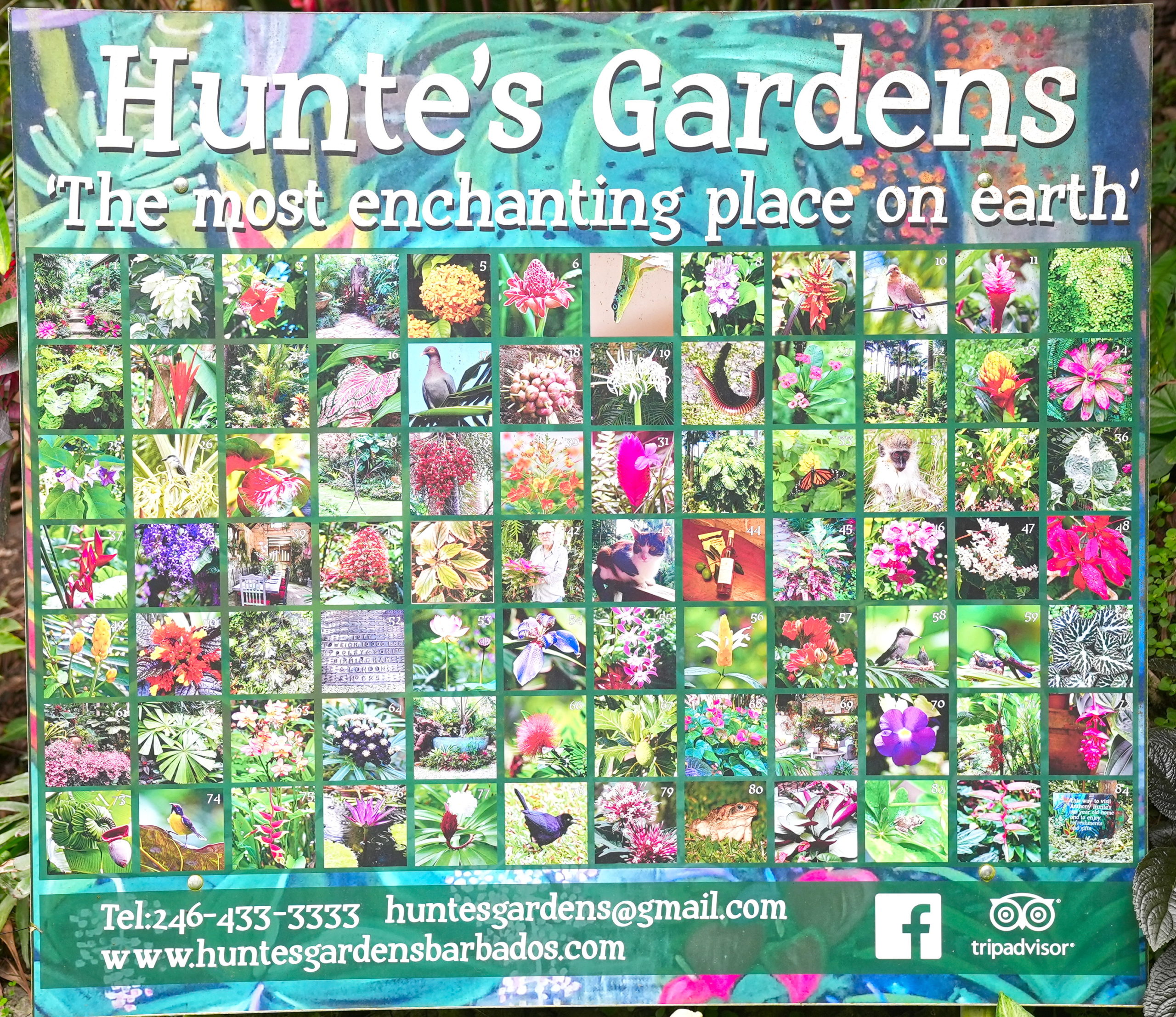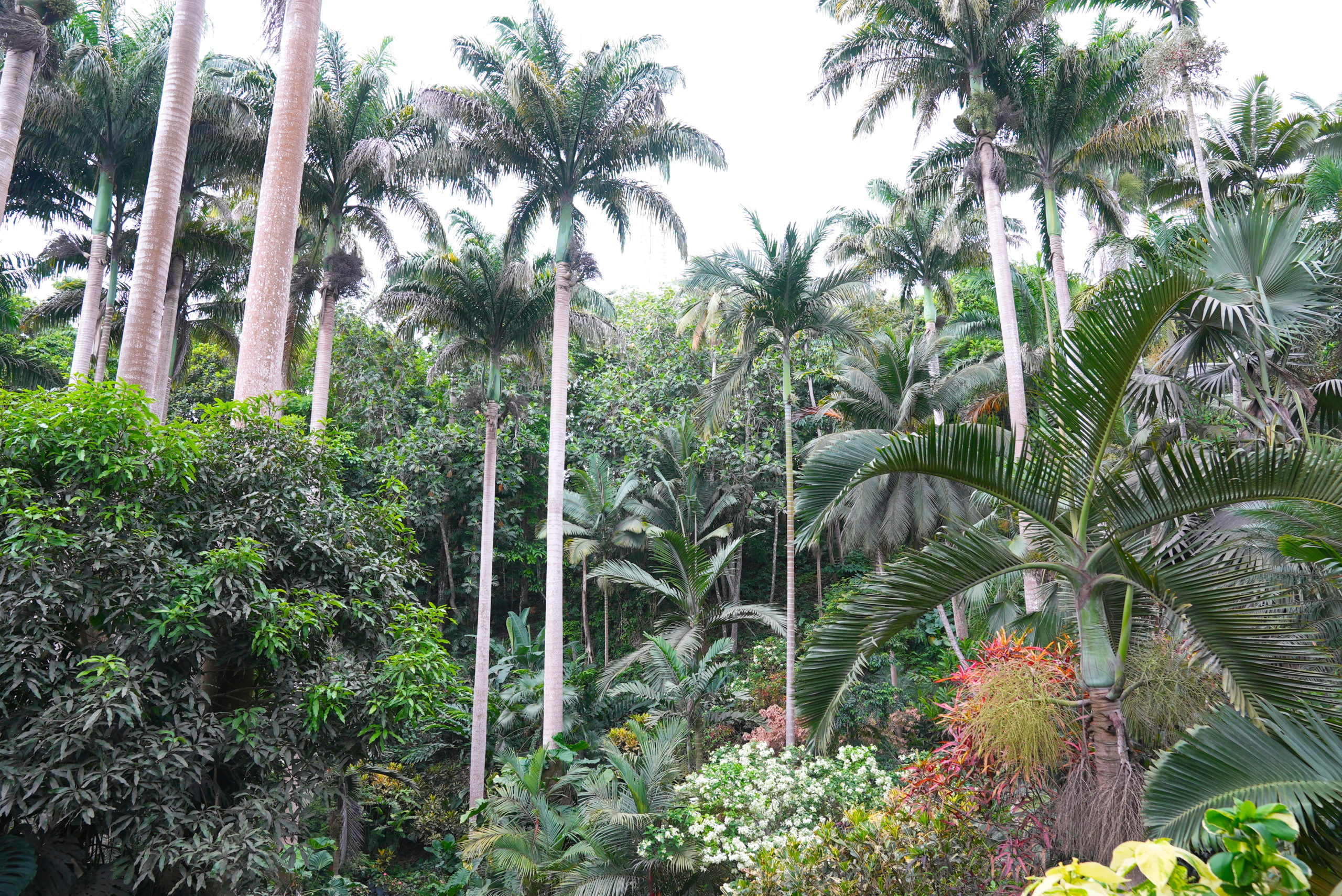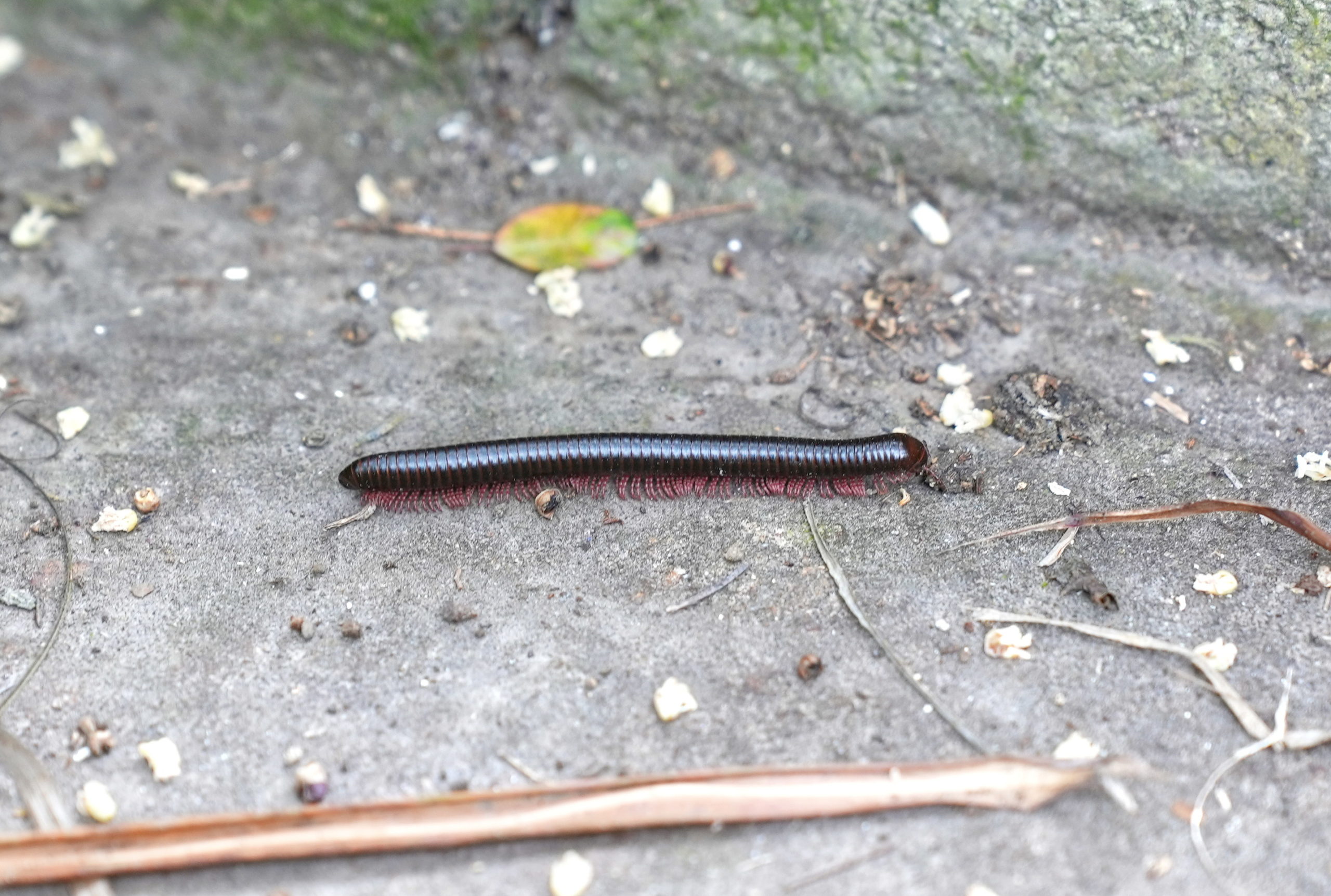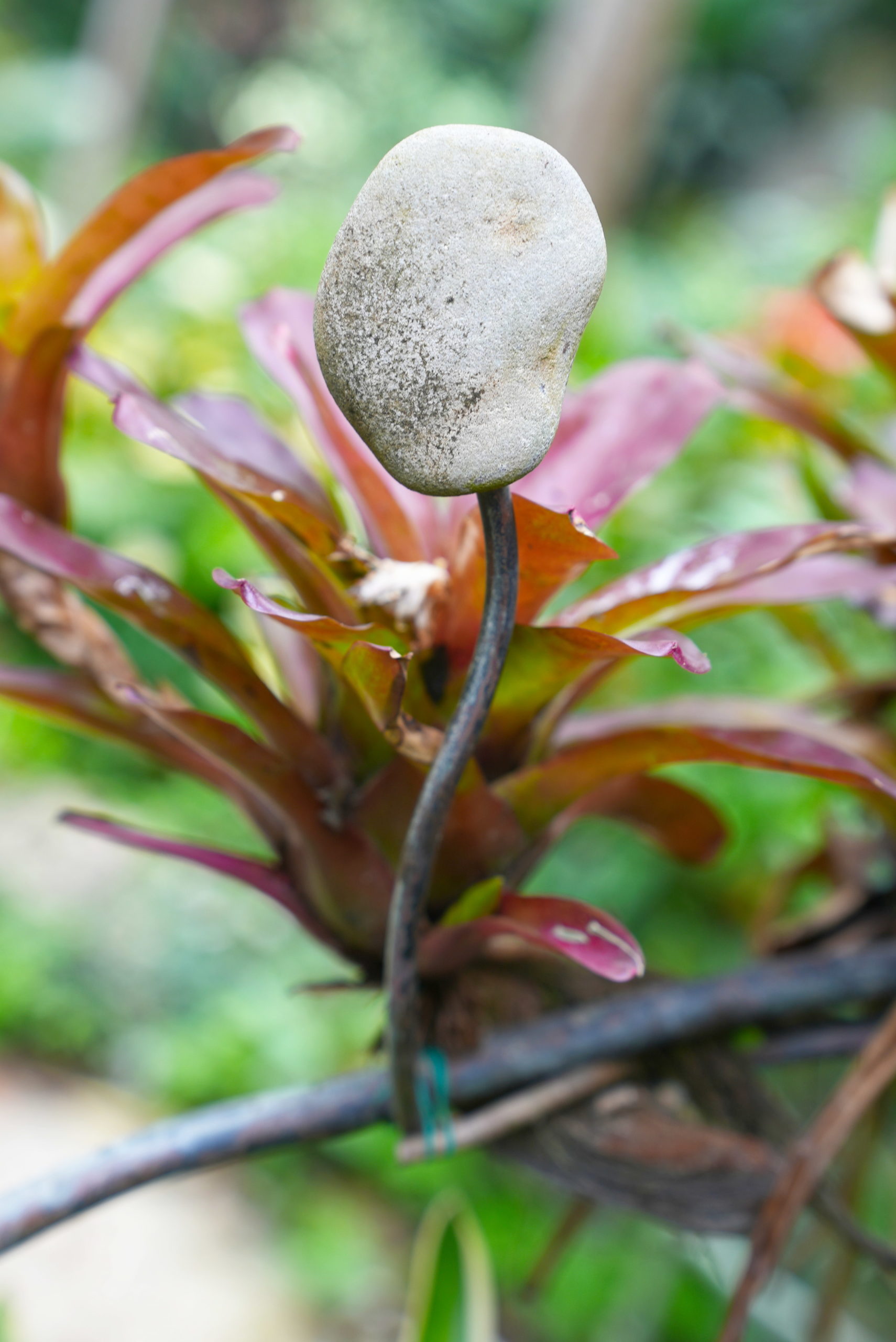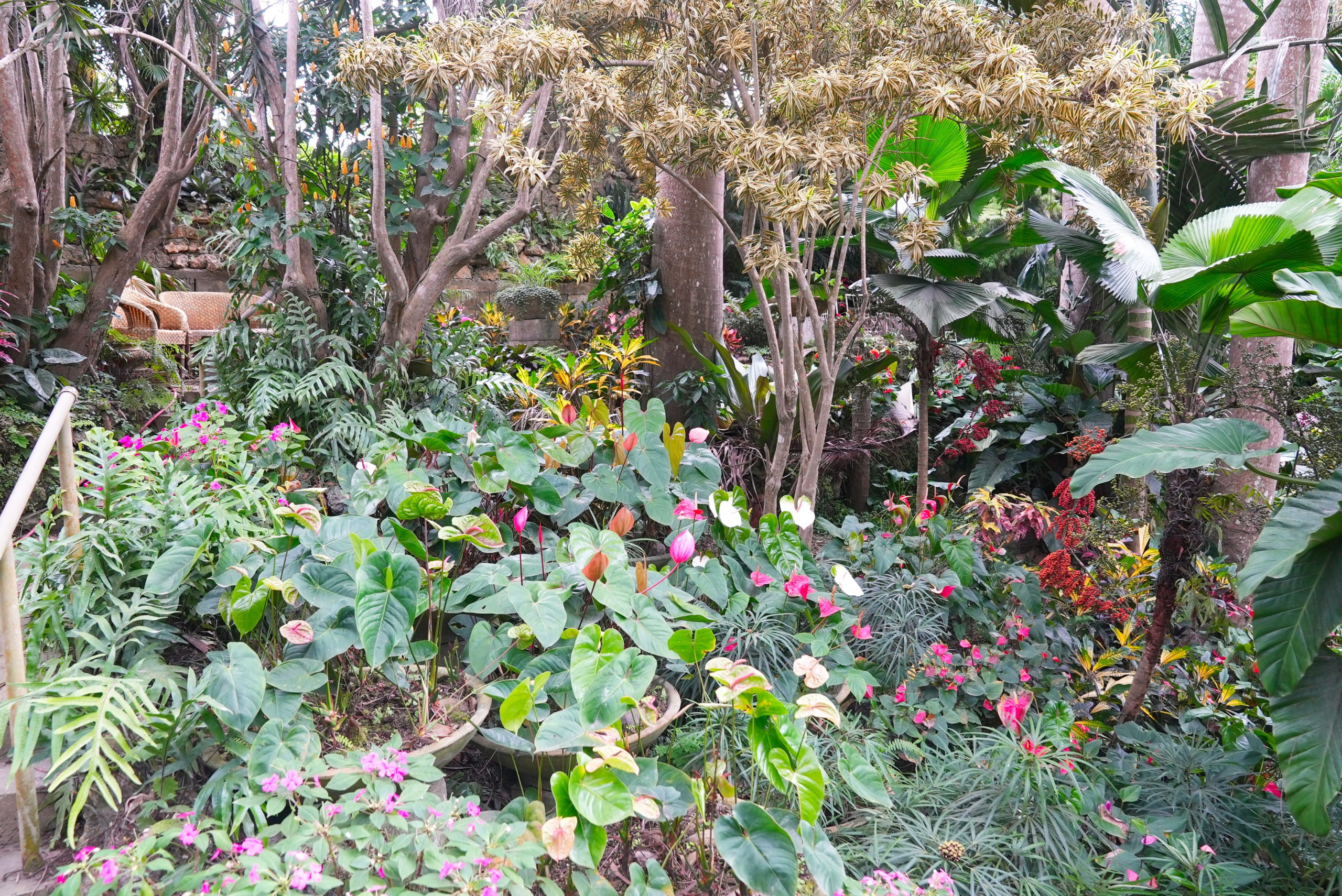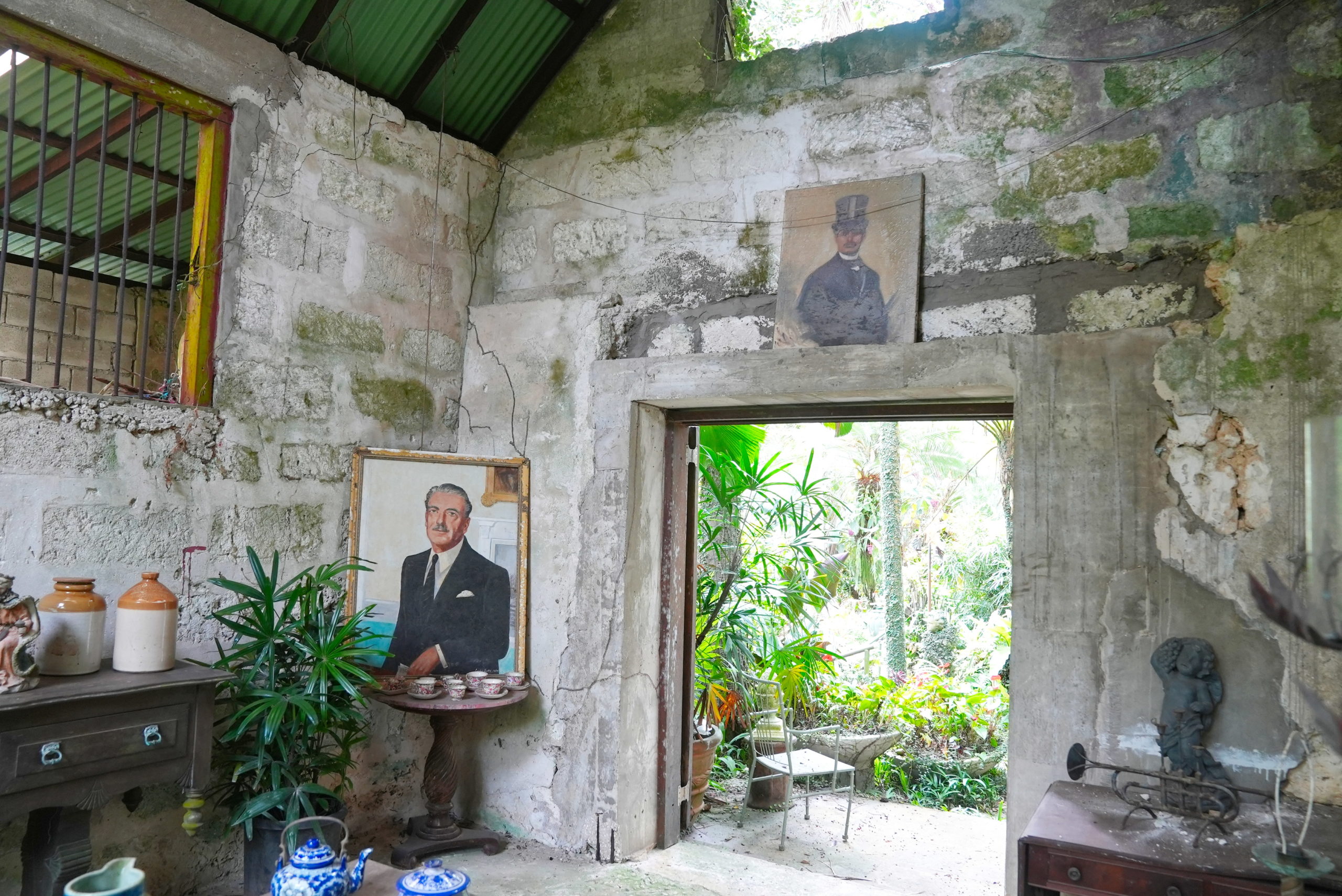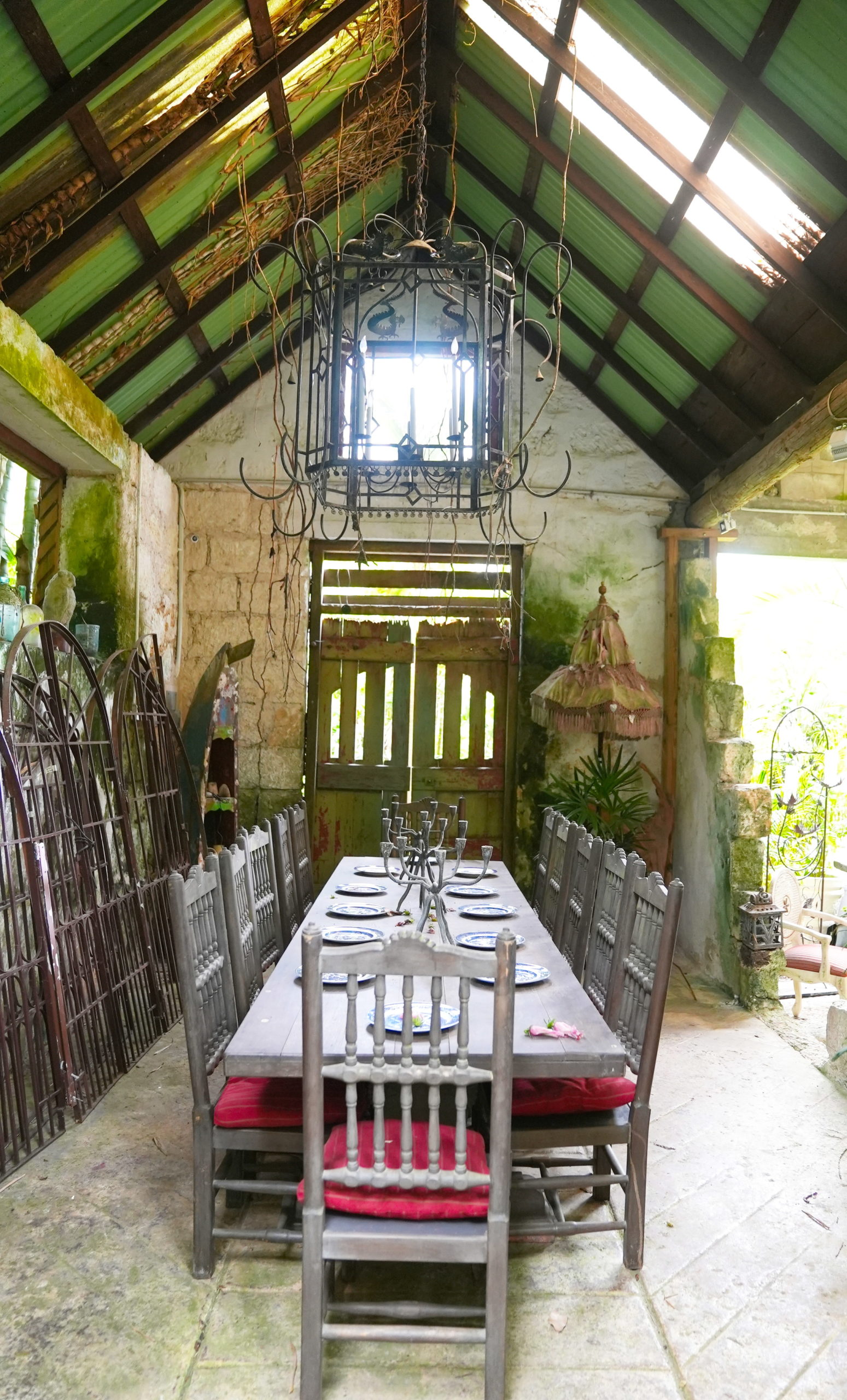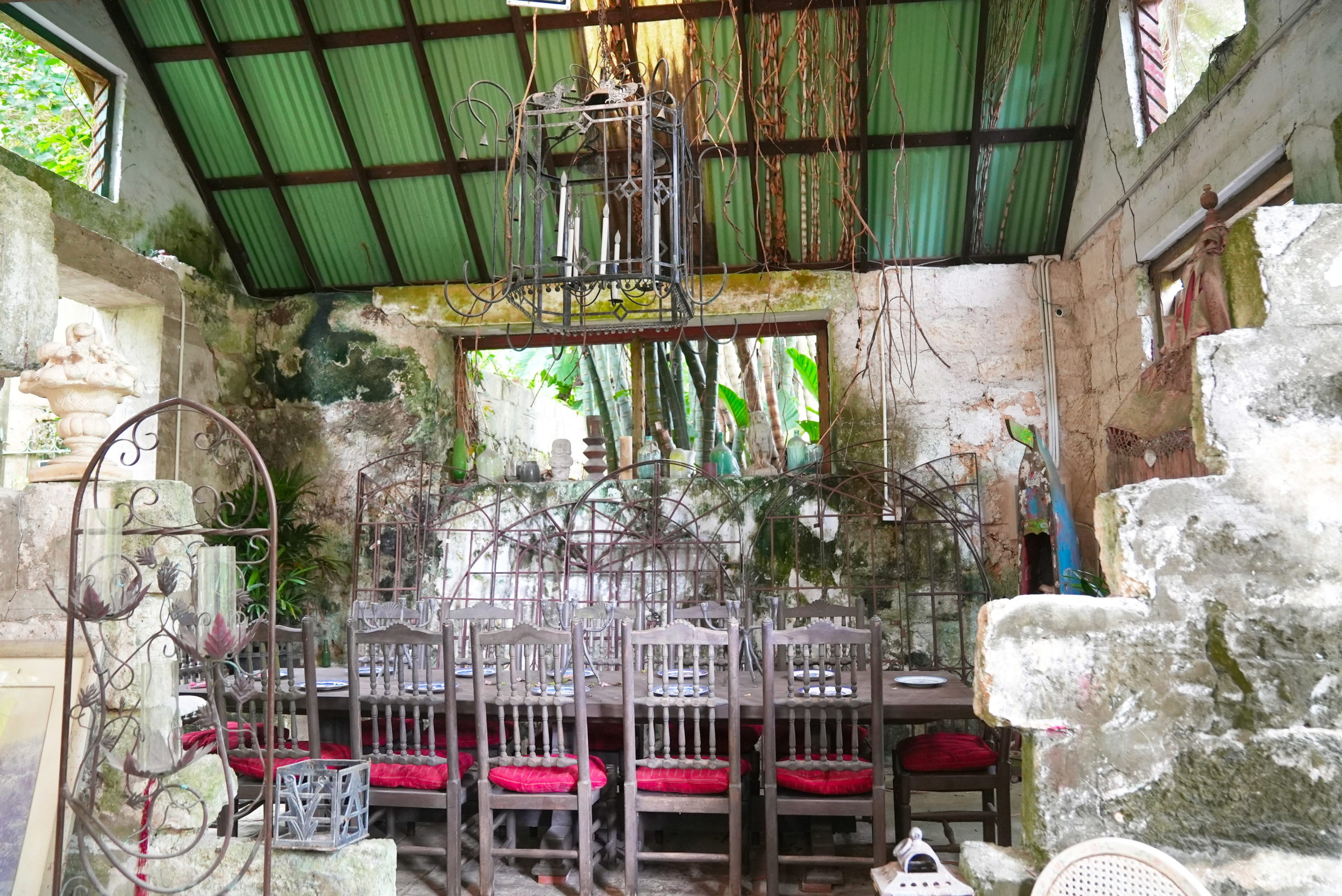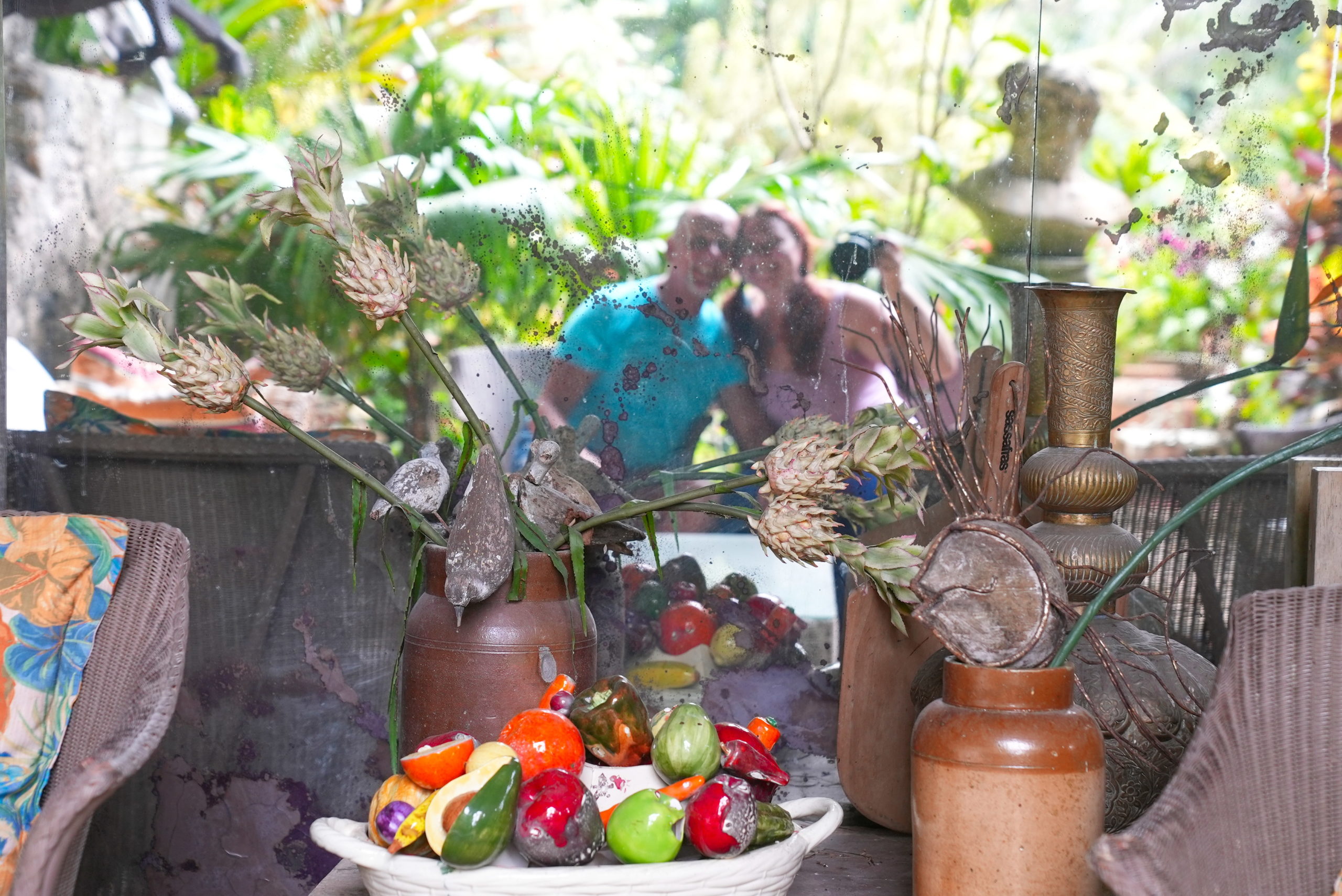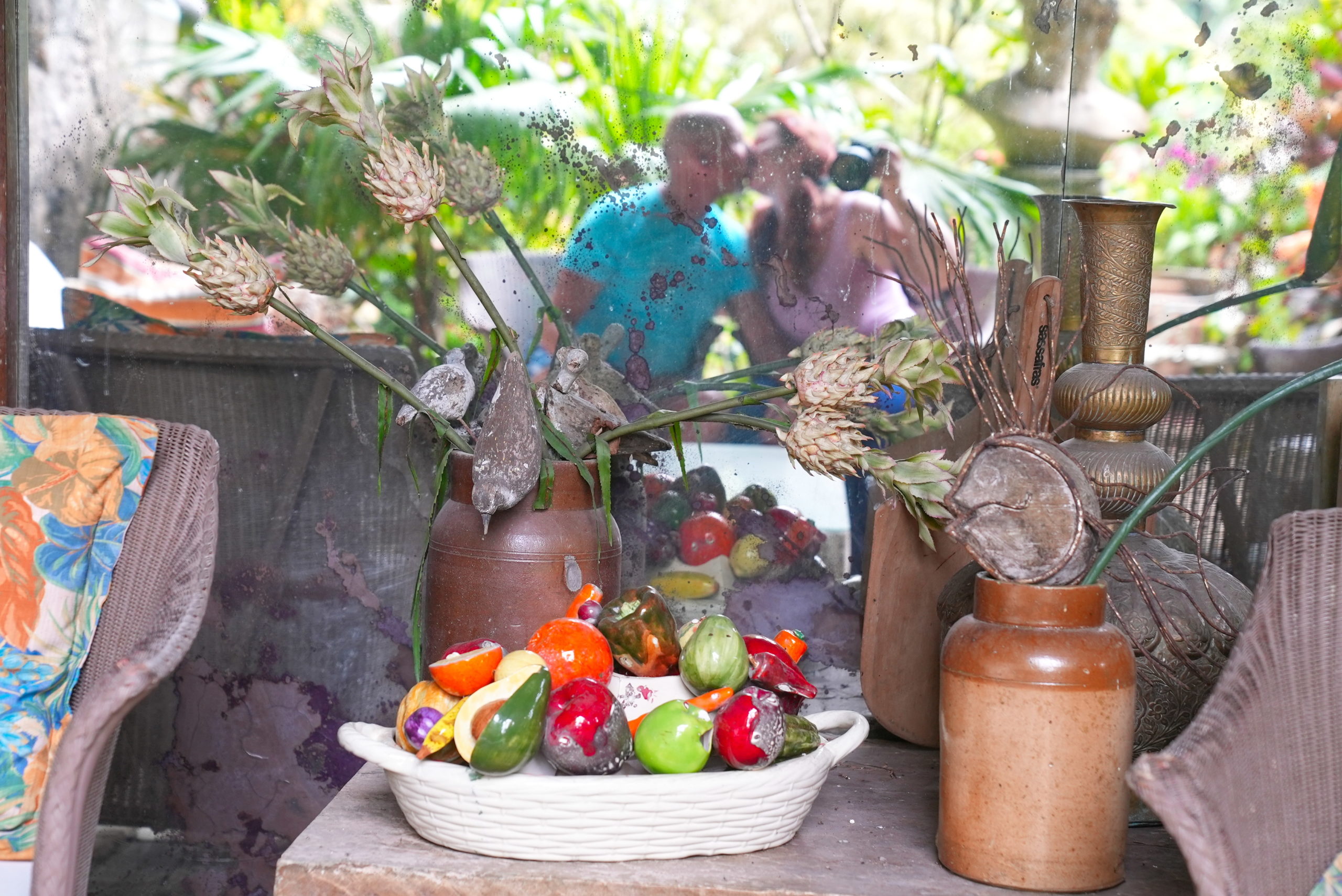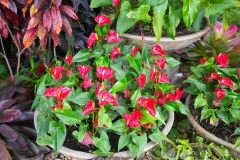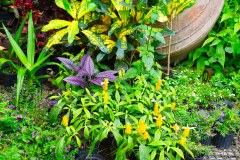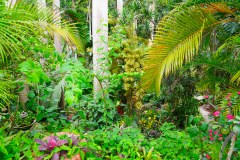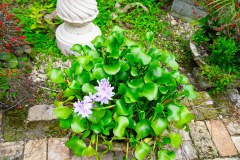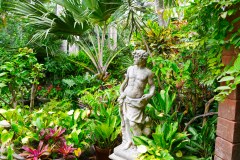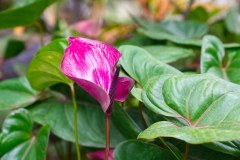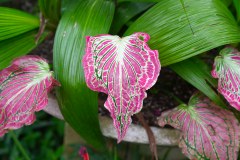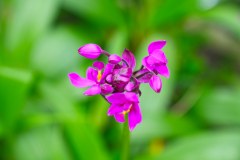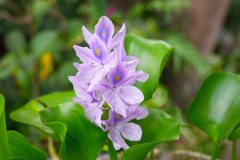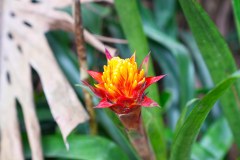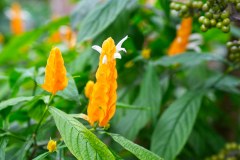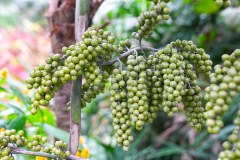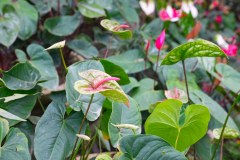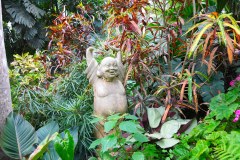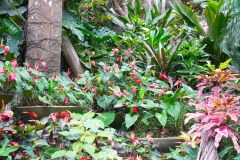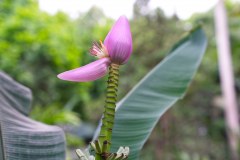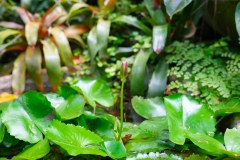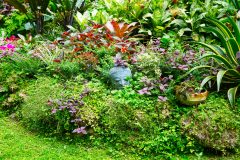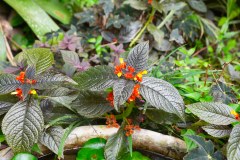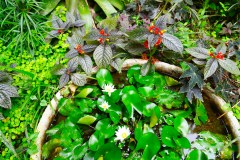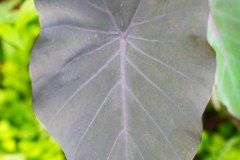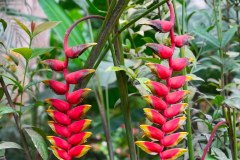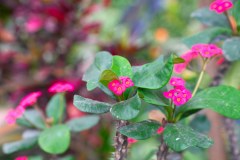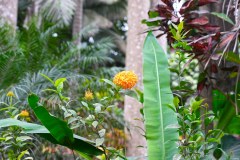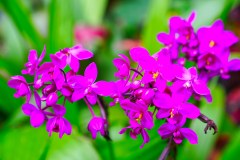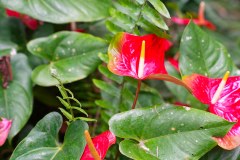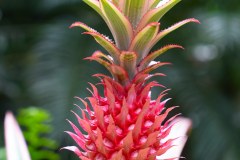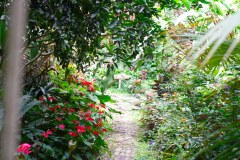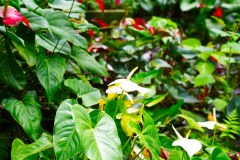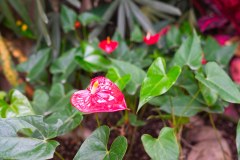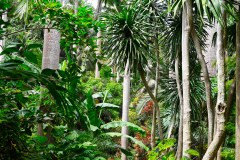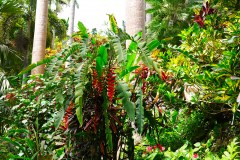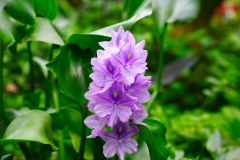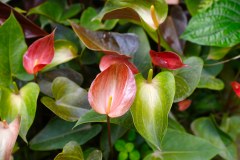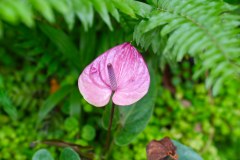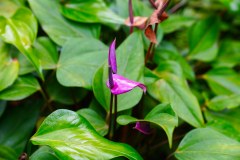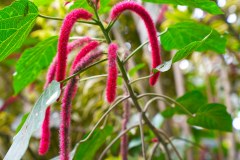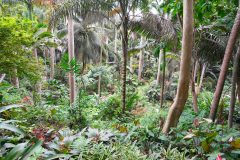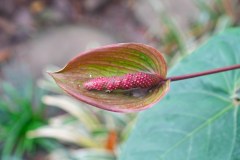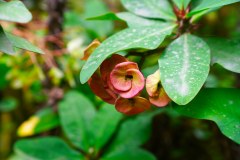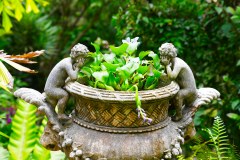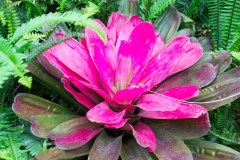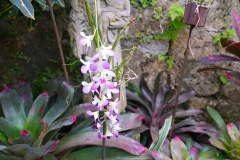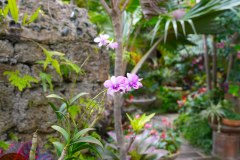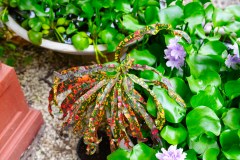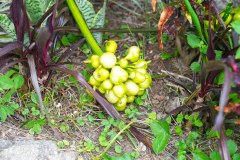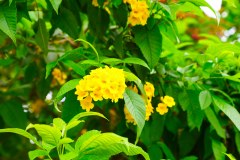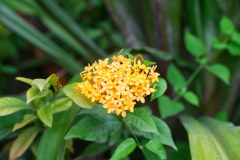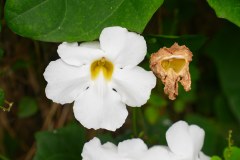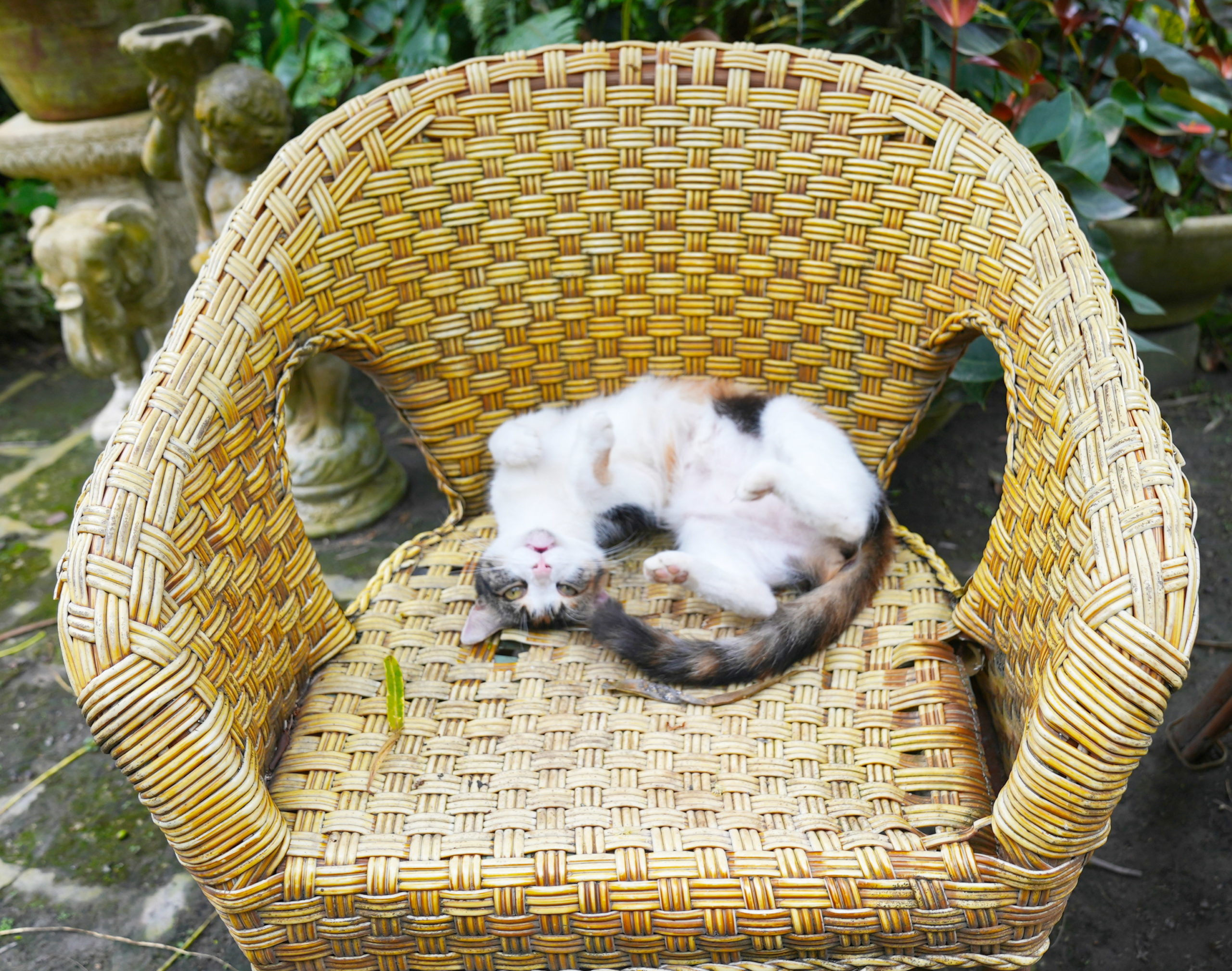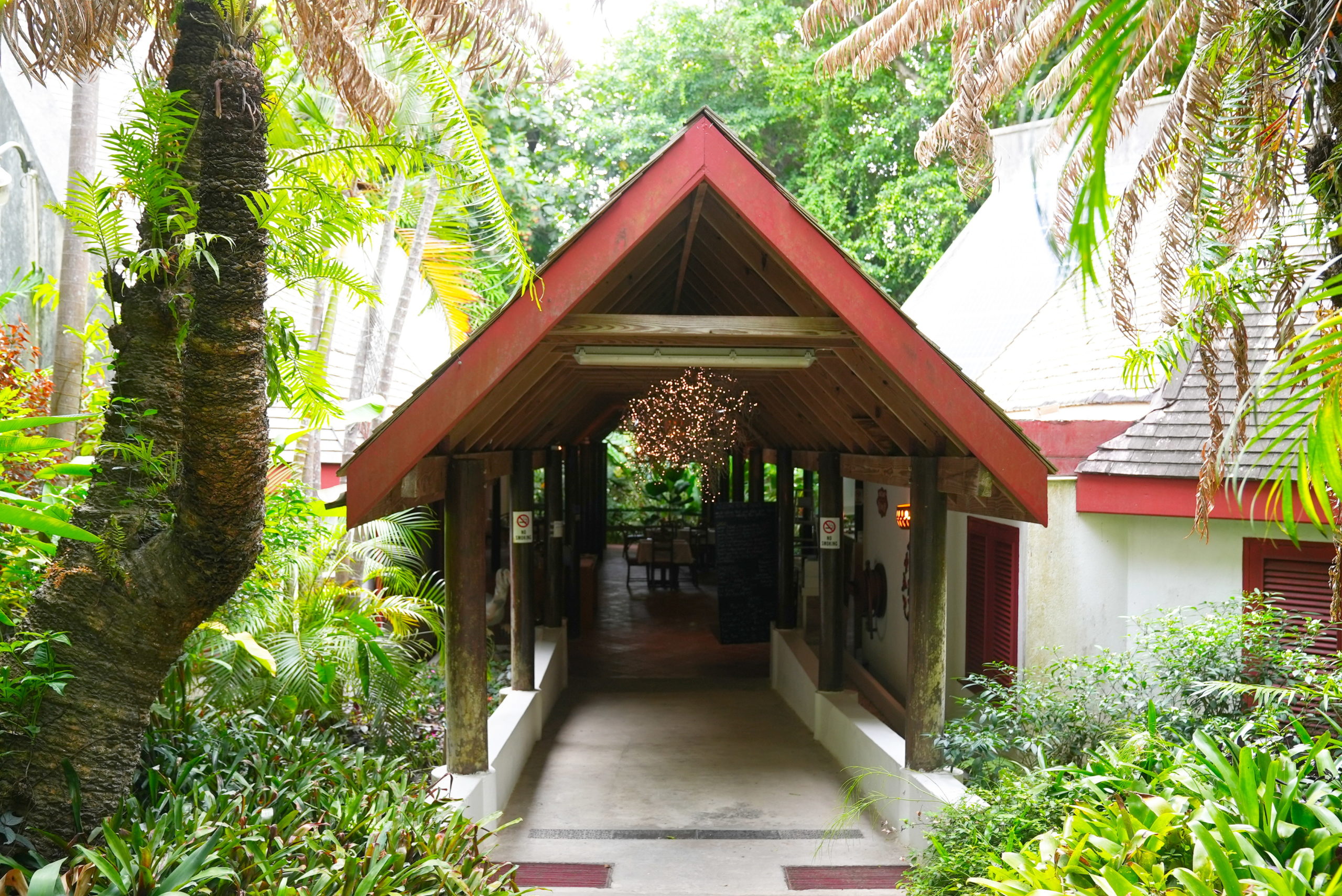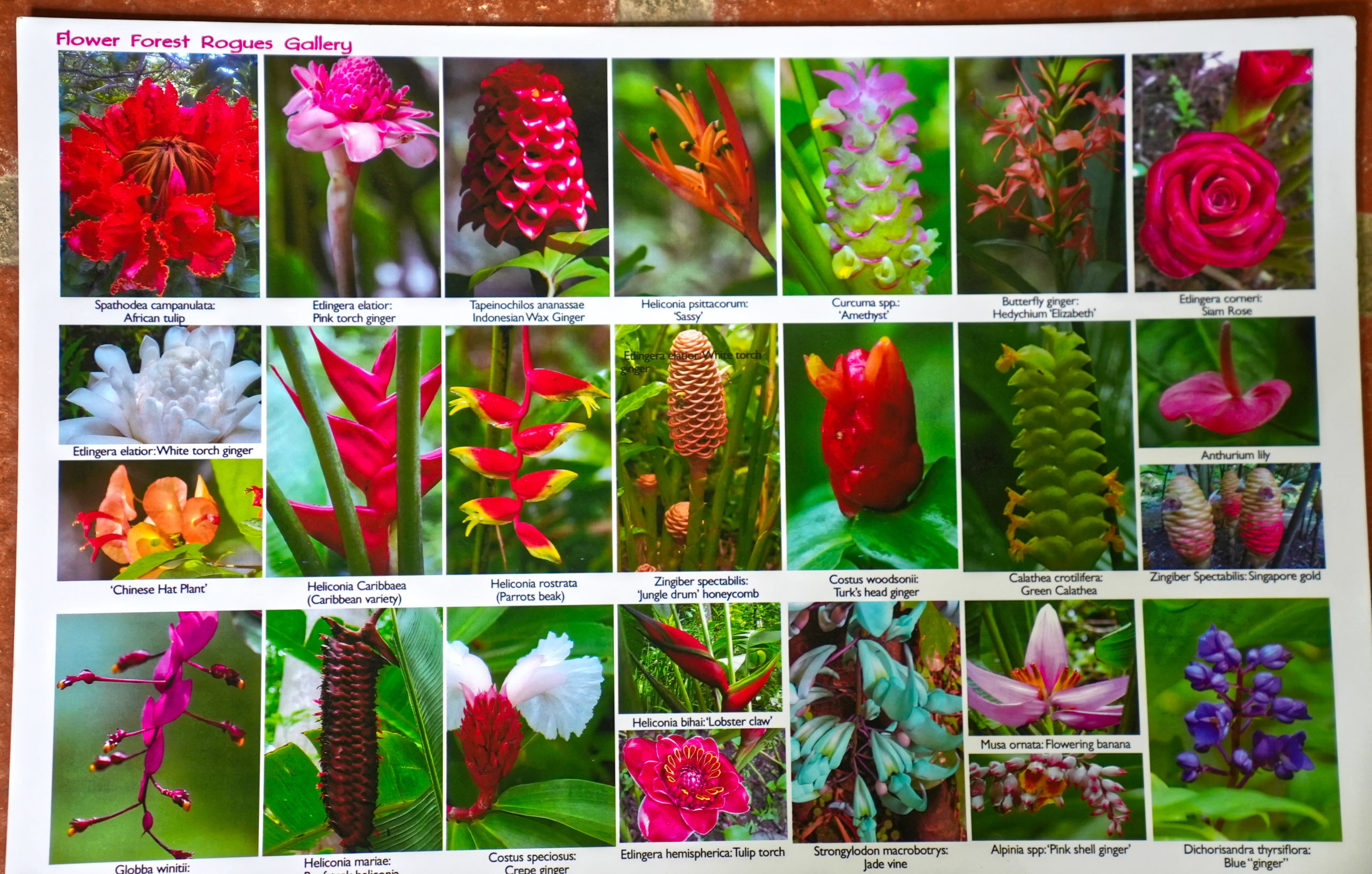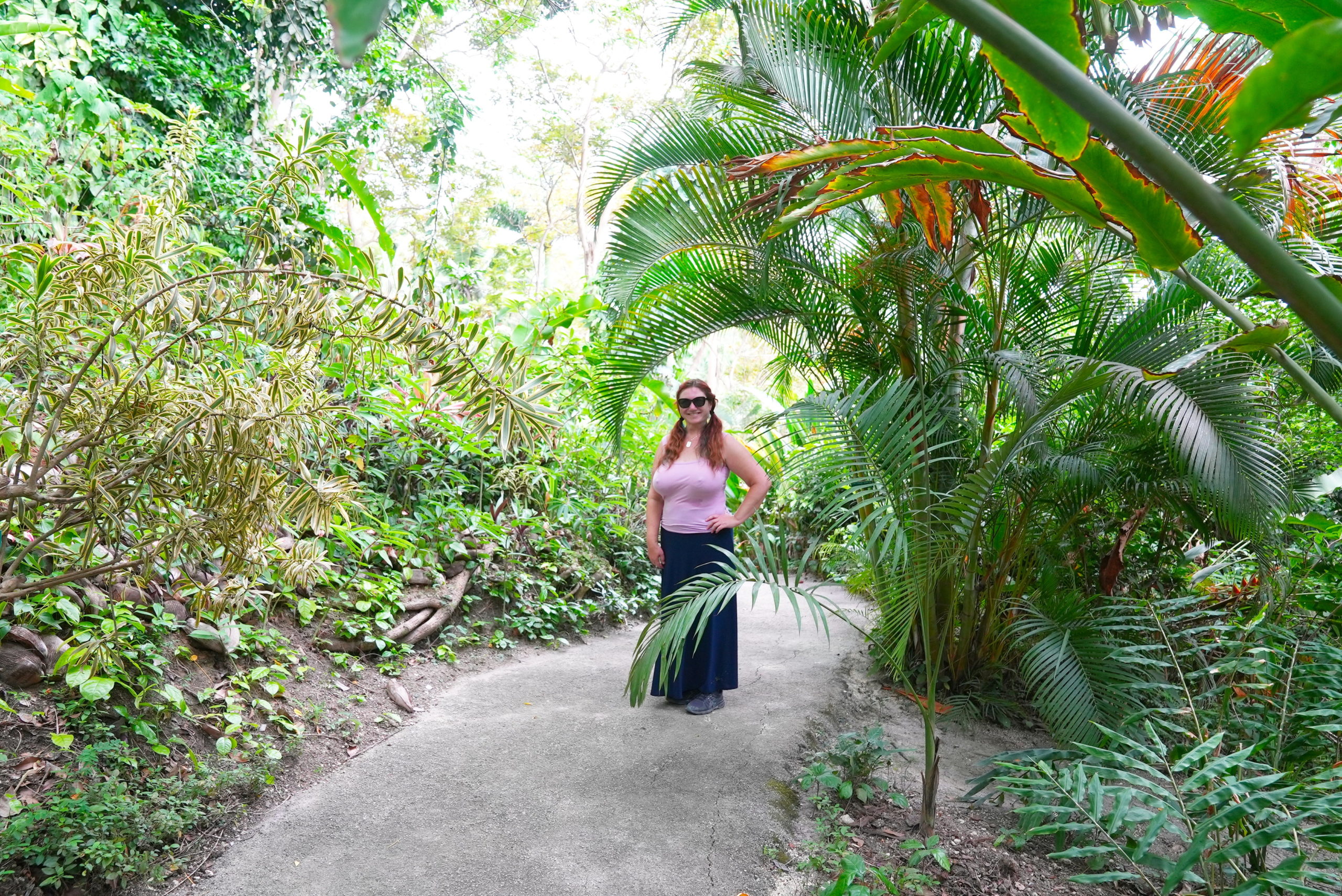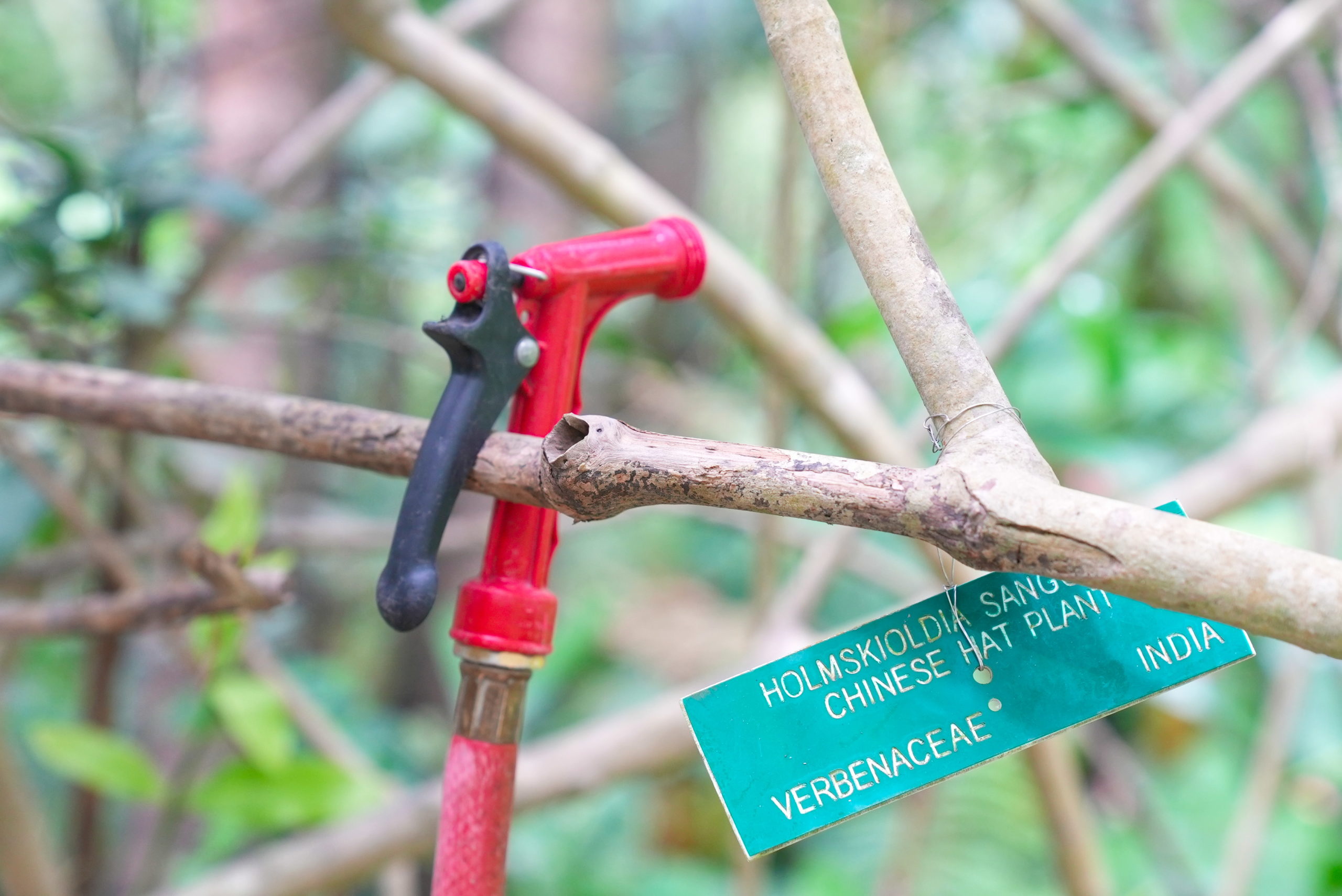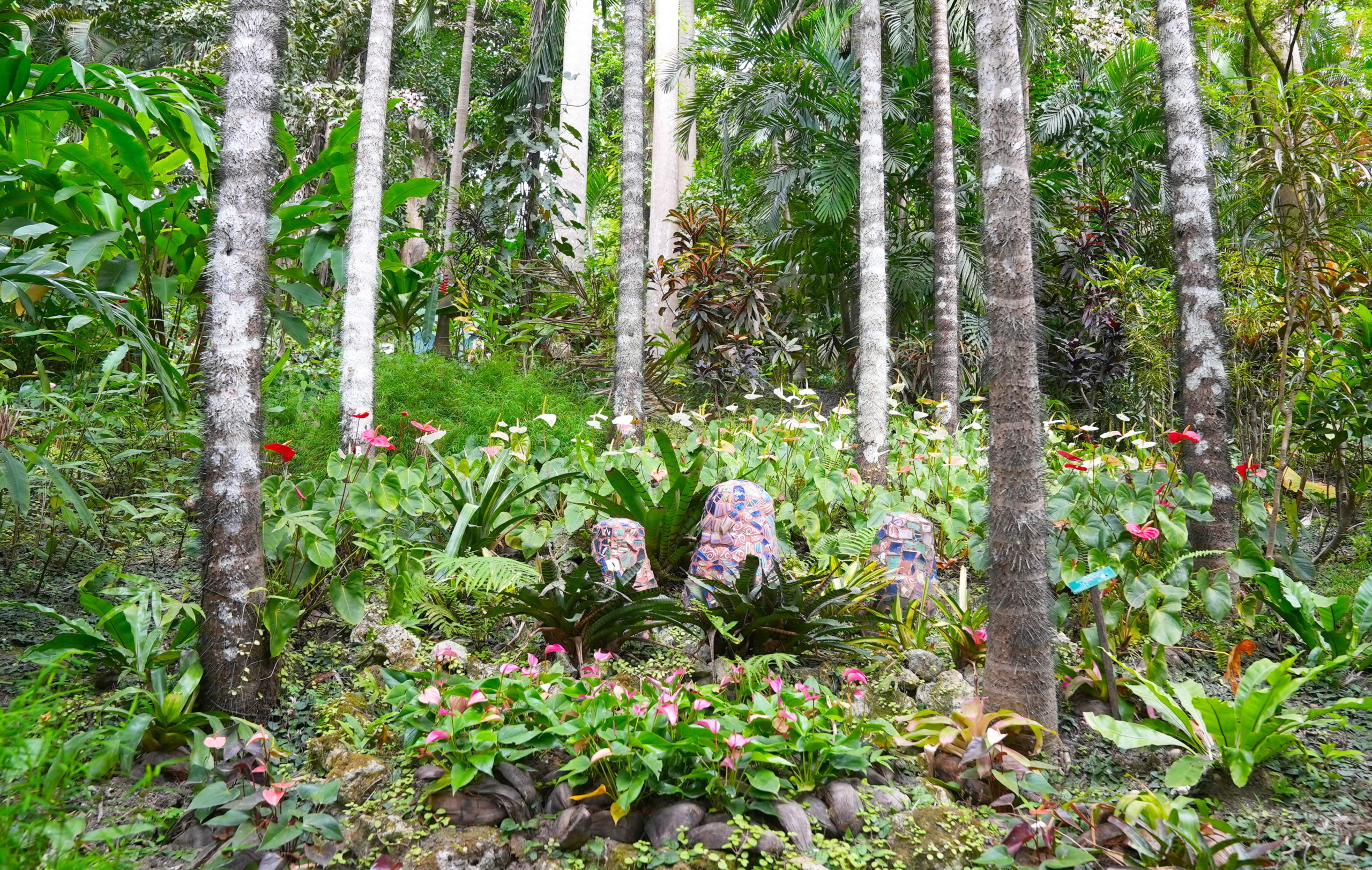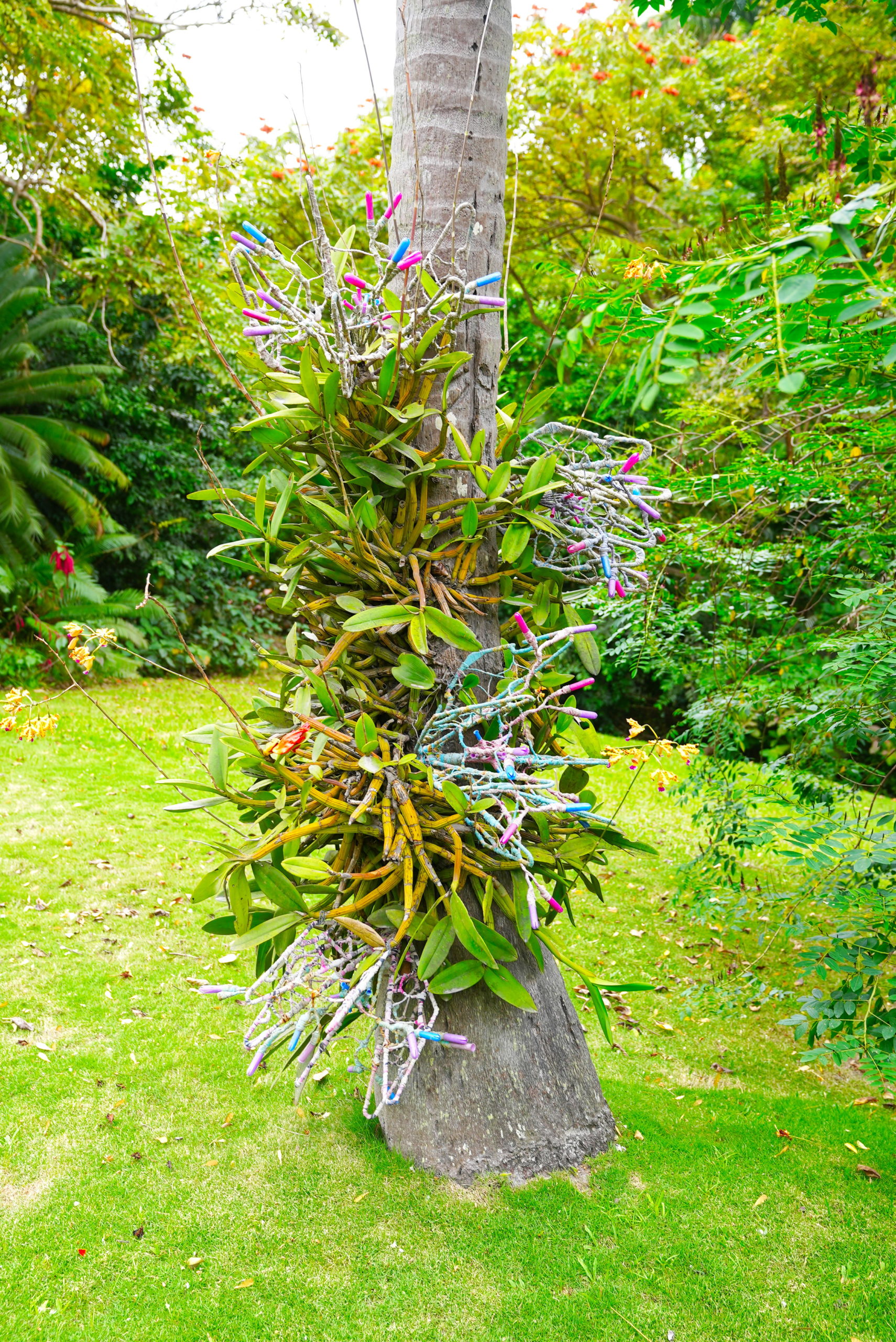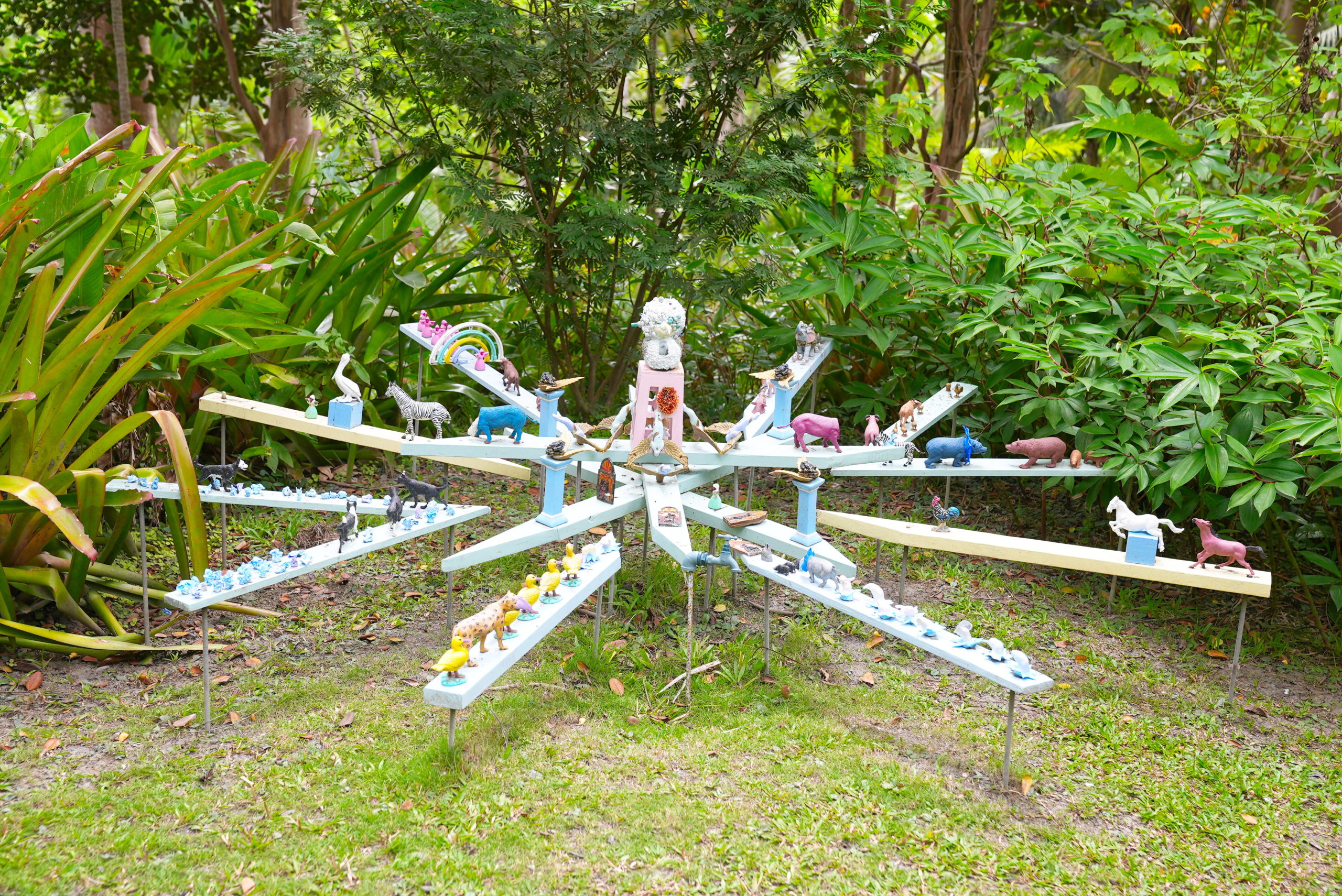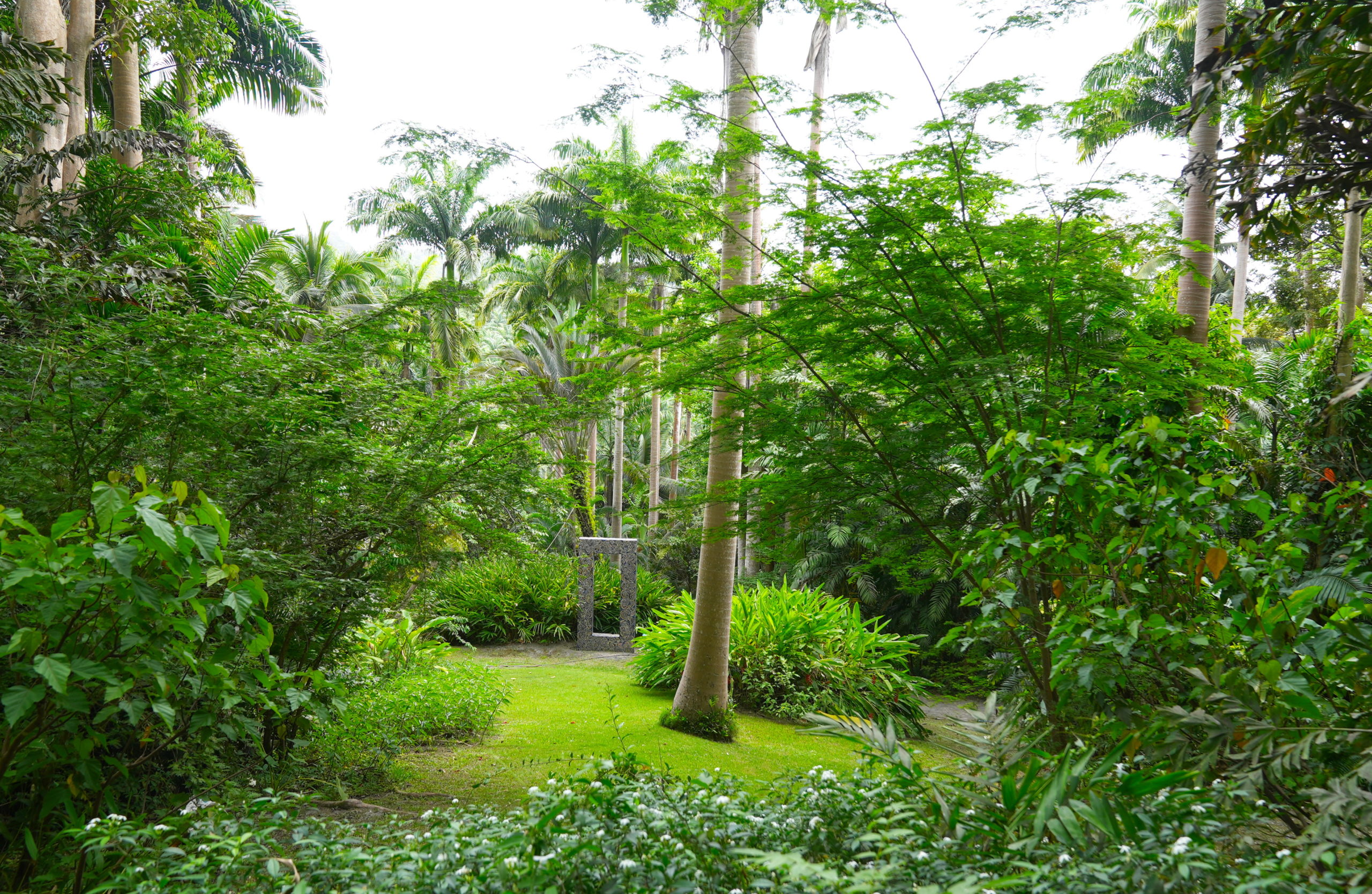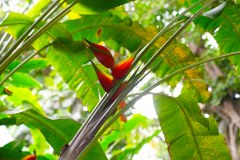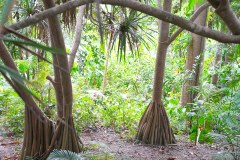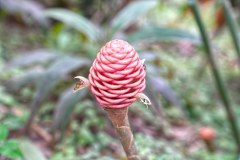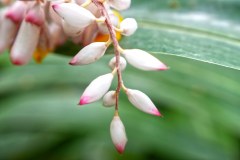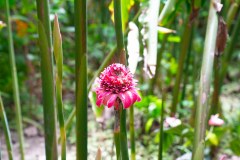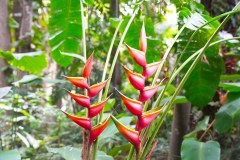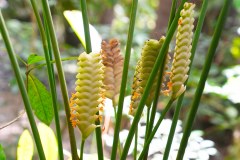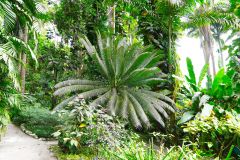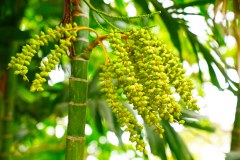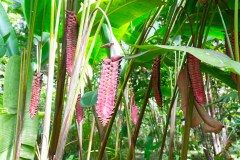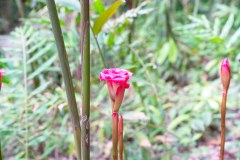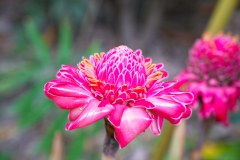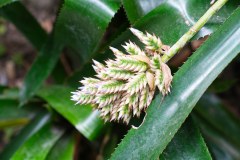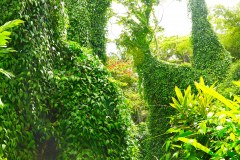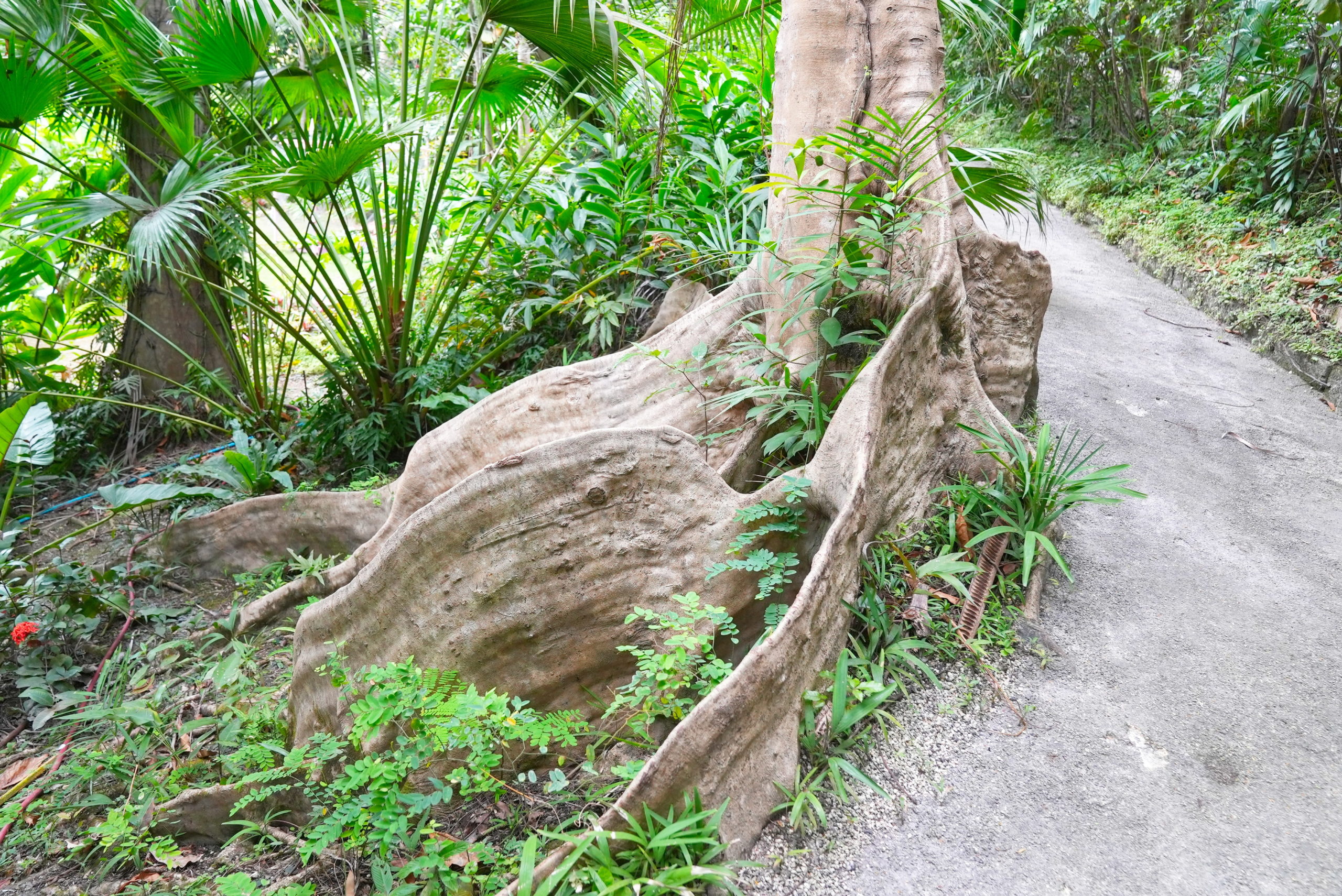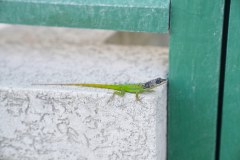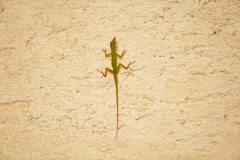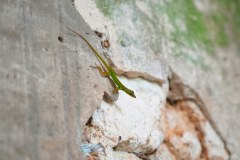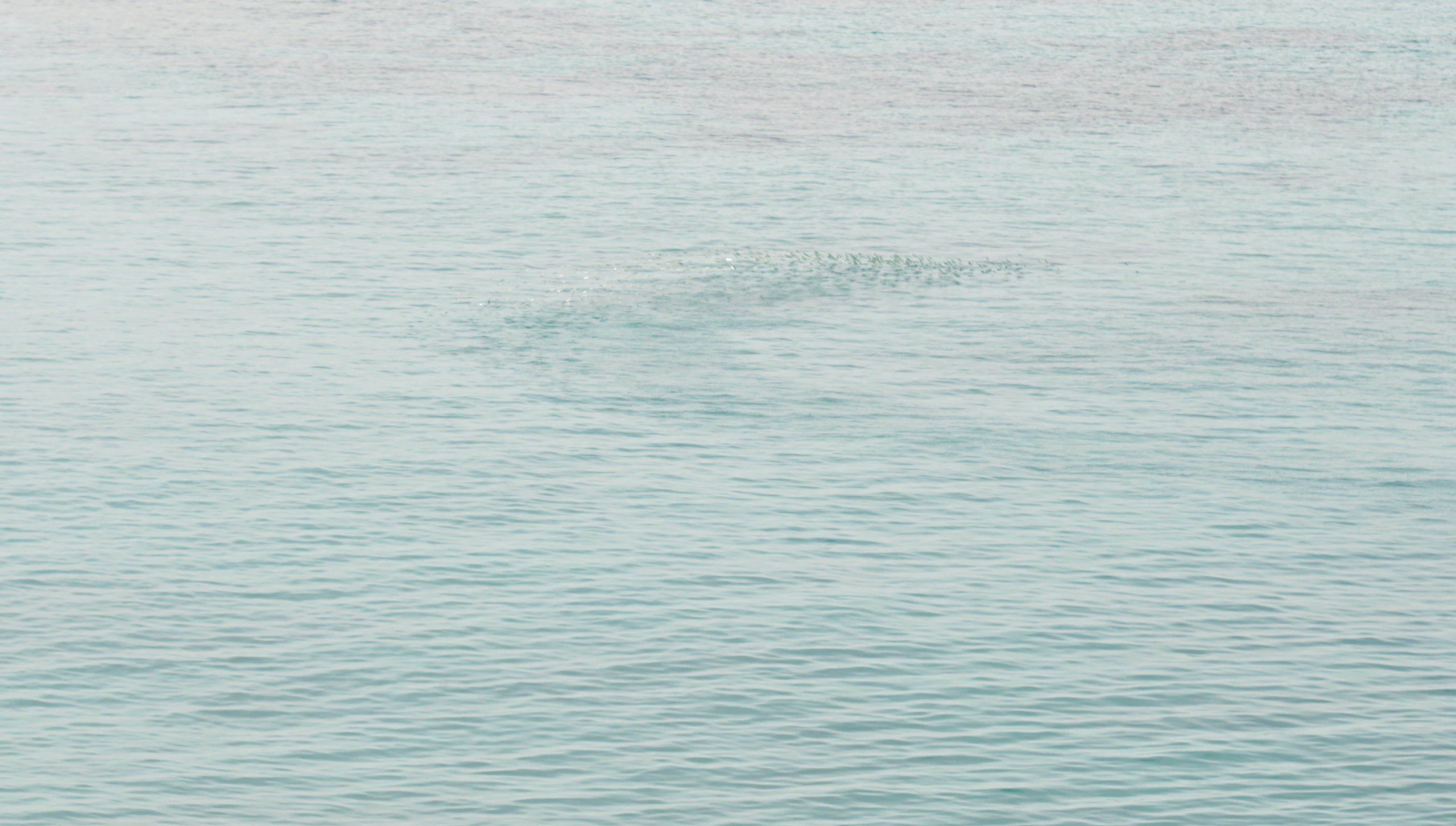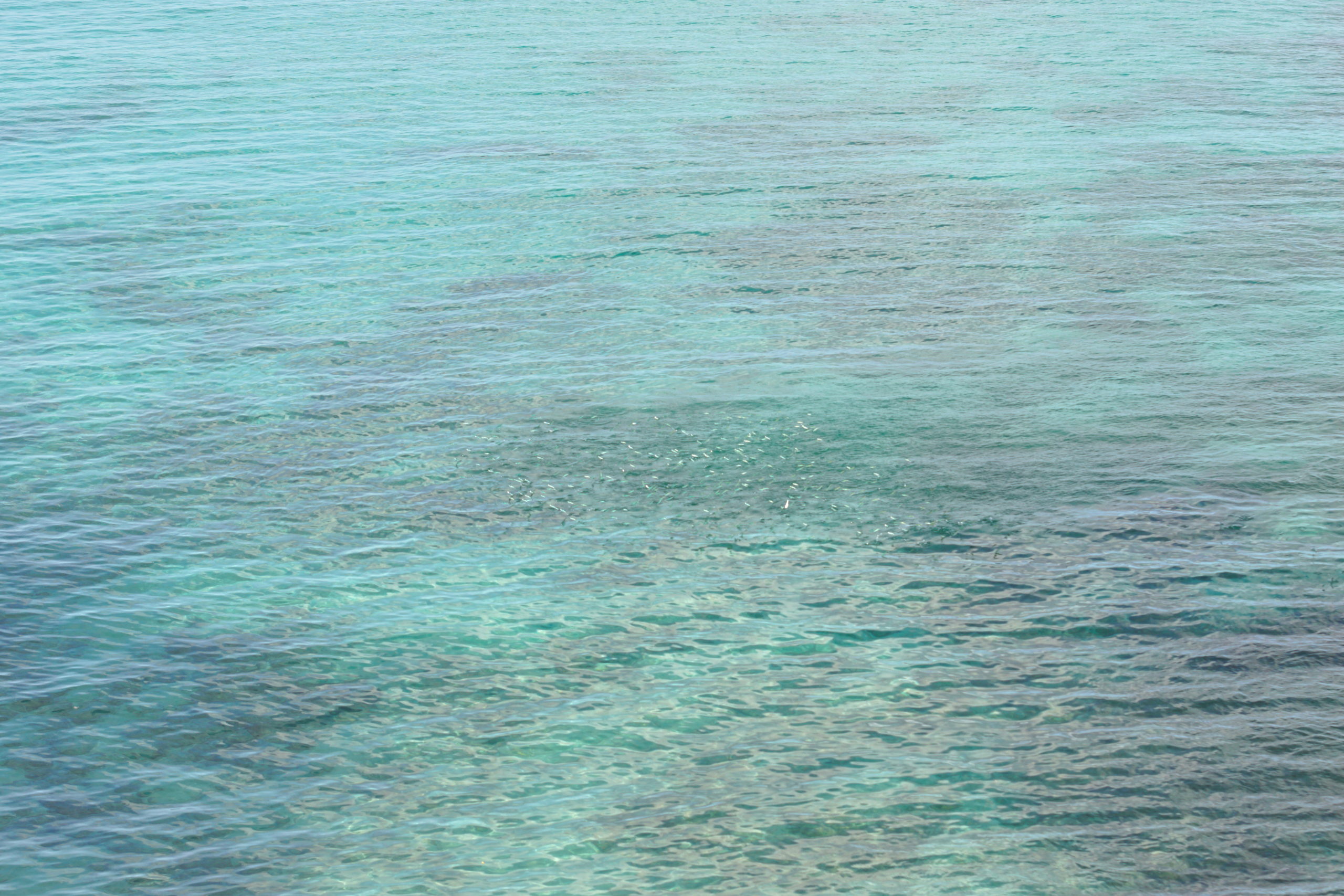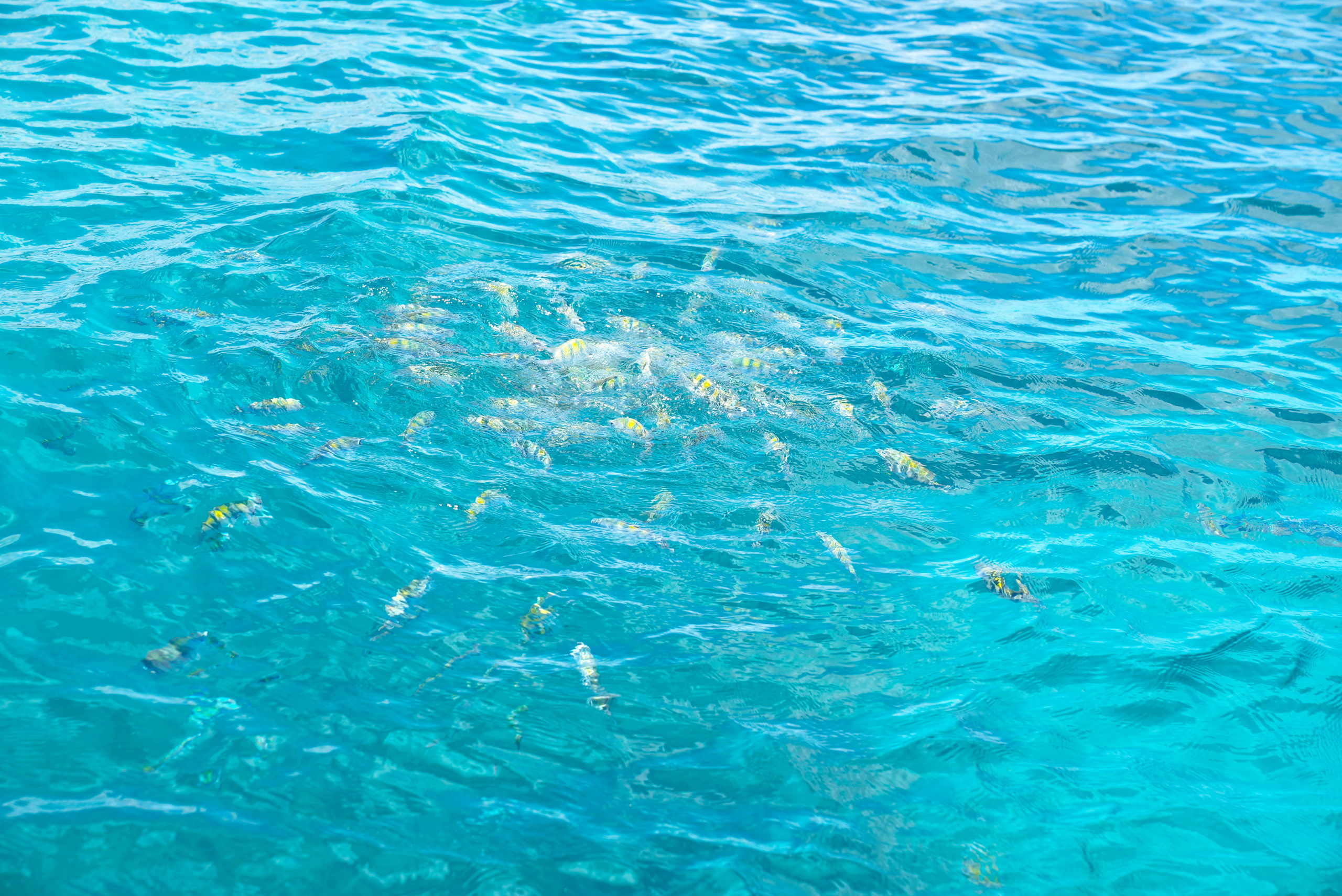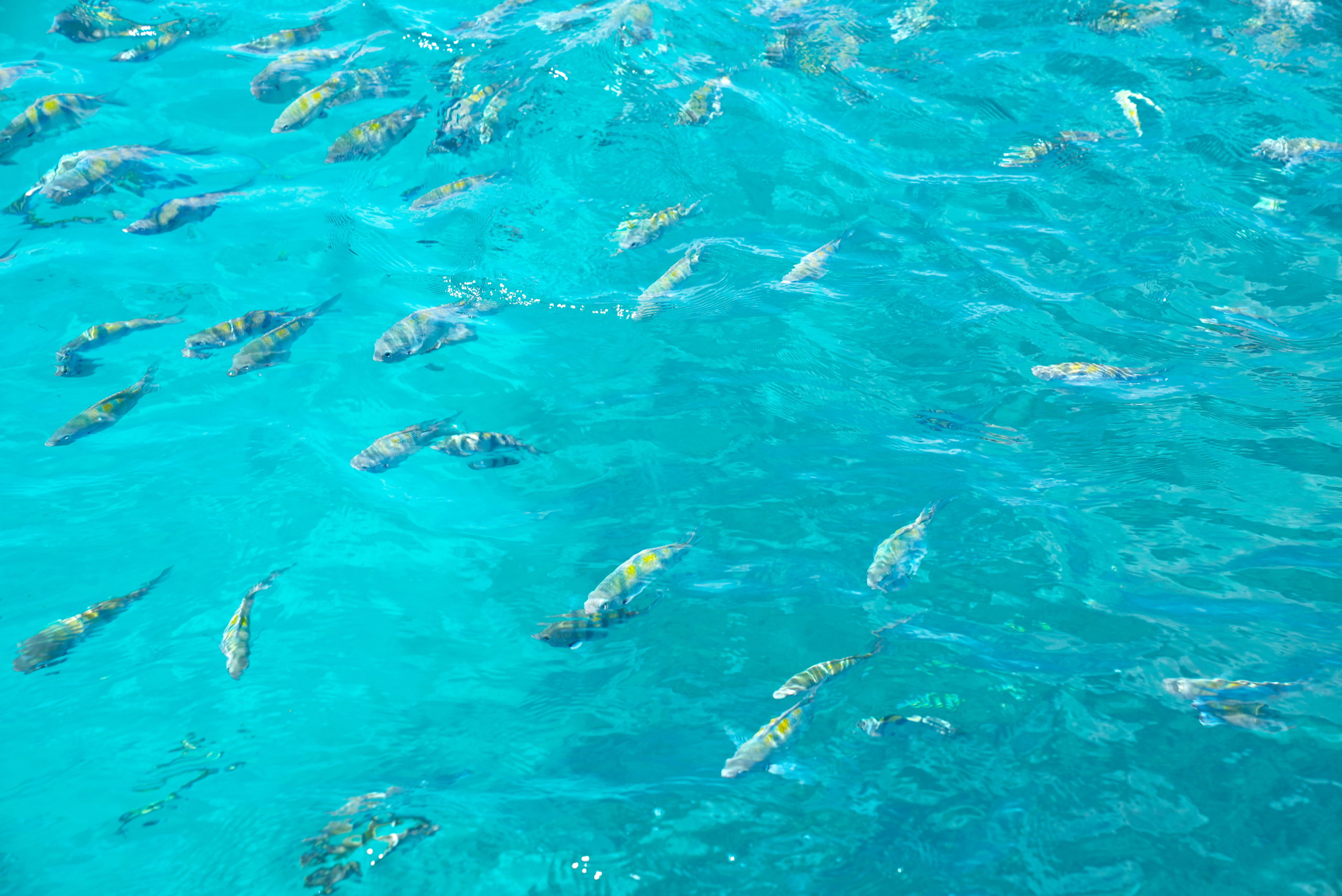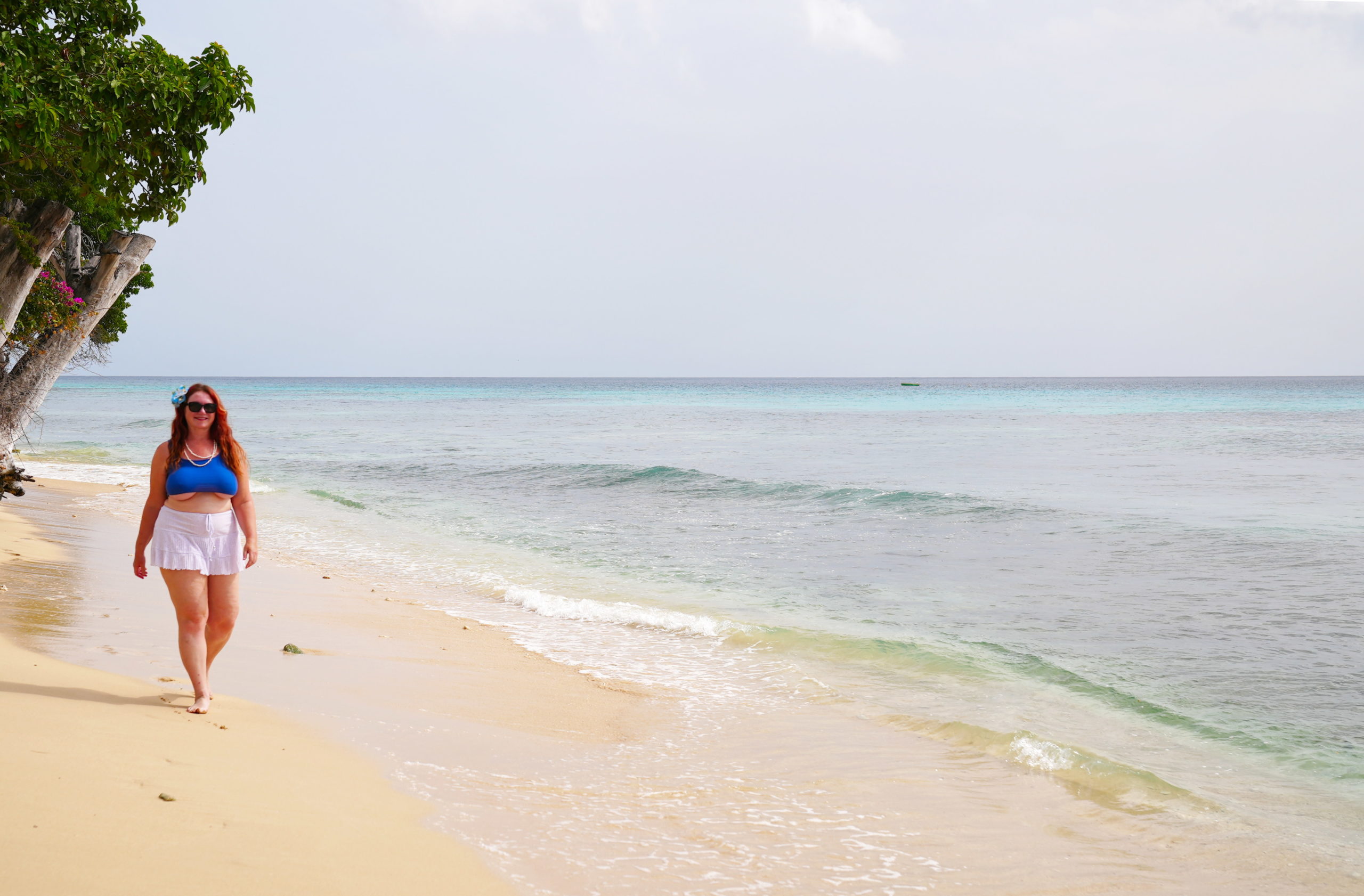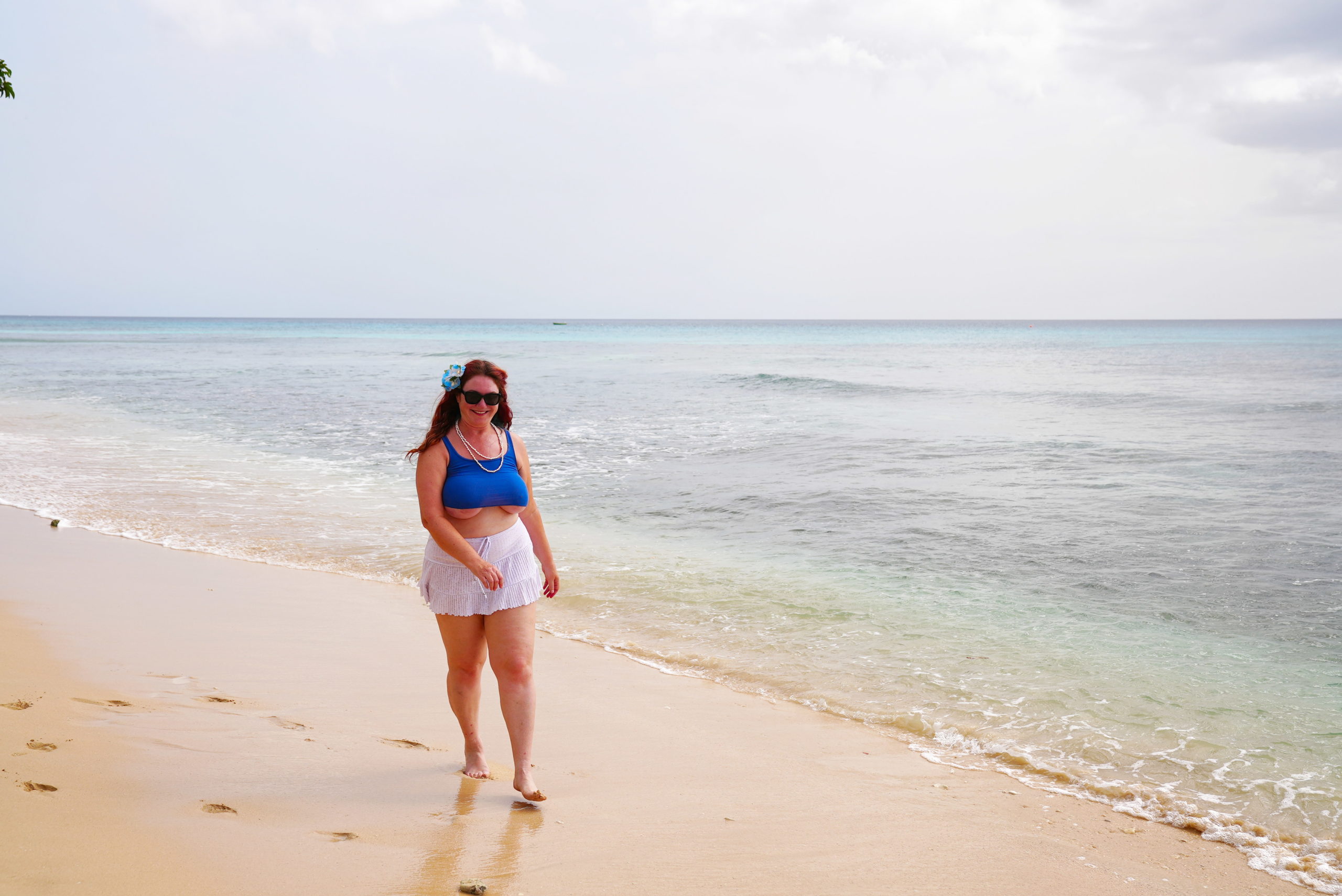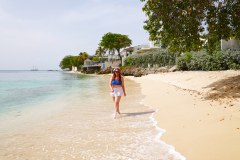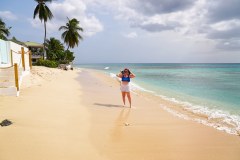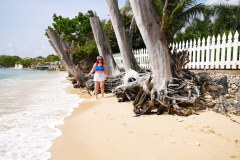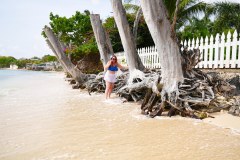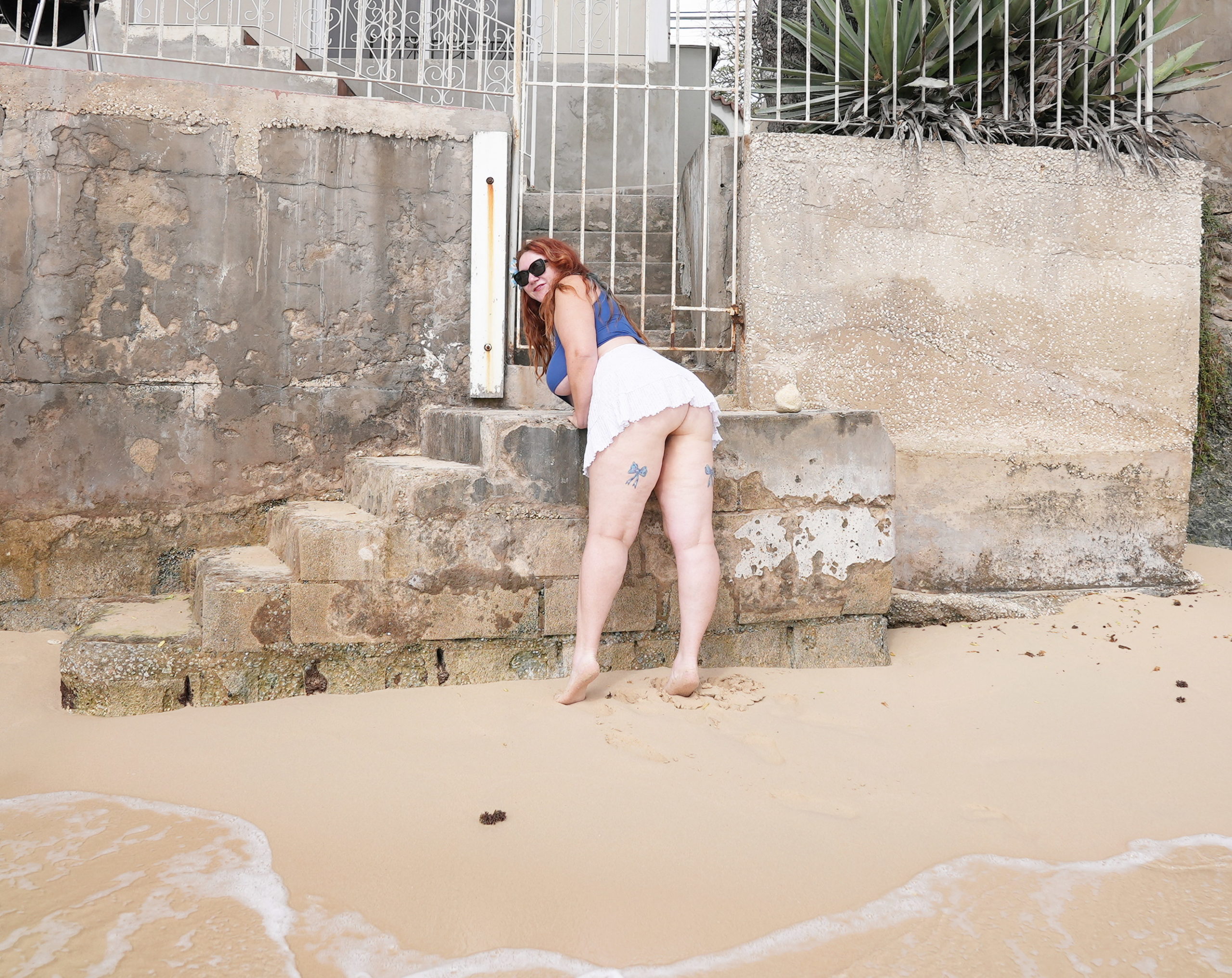Our adventures in Barbados continue as we explore the plants and animals found on this Caribbean island.
According to the world-famous internet, “the fauna of Barbados is less diverse than that of other Caribbean islands.” Well, no matter. There are still lots of fun critters to see here.
Around the Island
Let’s take an informal tour of the island and see what kind of critters we can find.
You don’t have to walk very far in Barbados to realize much of the island is a petting zoo. Here, a member of Capra hircus assists with landscaping activities.
Cows are magnets for bugs, and the helpful egret deftly plucks them off symbiotically.
The brocket deer is not found on Barbados (just as the grizzly bear is not found in New York City). But here we have one, probably named Dennis, with his fauxhawk and stubby antlers, living at the Barbados Wildlife Reserve.
The caiman, also found only at the Barbados Wildlife Reserve, looks completely bored. The whole time we are here, it does not move.
Also at the Barbados Wildlife Reserve are helmeted guineafowl, native to Africa. You know, I’m beginning to think that Barbados has no endemic wildlife at all.
Besides non-native guineafowl, we also find non-native peafowl at the Barbados Wildlife Reserve.
We don’t know what this even is, but at least it doesn’t look hungry. Anyway, we will have more about the Barbados Wildlife Reserve later in this article.
A critter that actually is native to Barbados is the green heron. This juvenile will soon get his or her colors, which might or might not be green.
We assume there are no mice around our house due to the diligence of this ferocious feline. However, if he gets any fatter, he’s going to need longer legs.
Okay, now that we have an overview, let’s look at some of the plants and animals in more detail, shall we?
Barbados Wildlife Reserve
The Barbados Wildlife Reserve occupies four acres of mahogany forest in north-central Barbados.
There are no highways in Barbados, just a crisscross of windy roads. But it’s a small island, you can’t get lost, and if you have an electronic navigator, eventually you will find the place.
The reserve is a series of paths through the forest. The reserve is fenced in, but the monkeys can climb over the fence. Apparently, they stick around because they are fed daily. The sign suggests that we might not see them. That wasn’t the case.
The monkeys are everywhere we look. We keep our distance and do not approach them. Rather, they approach us.
They are pretty brave to approach a creature that weighs ten times what they weigh. I suppose it’s because people live them alone except to feed them.
Had he taken it, I don’t know how I would have explained it to my insurance company.
Well, the advantage of their boldness is a really good close-up.
When you see a monkey with two tails, that means there is another monkey hanging on upside down.
And this is what the babies look like (more or less) right side up. You can see, too, that the females with babies approach us more closely than you’d think they would. I guess not getting hunted for food is a good thing, right?
Monkeys. Lots and lots of monkeys.
No one says, “Come to Barbados to see the monkeys.” But they should.
The Reserve also has a collection of red-footed tortoises. They may be native to Barbados or brought here in the 1800s by people; no one knows.
When tortoises are actively mating, they are easy to locate because the males make a clucking sound. However, let me assure you, it’s not as sexy as it appears here.
The female is giving me a “do you mind?” look, and the poor fellow at her side looks sad. Yup, it’s not a sexy as you might think.
The reserve has an abundance of cocks, specifically peacocks.
As with the other critters here, they ignore us as long as we keep our distance.
The whole island has an abundance of domestic cocks running wild (meaning, uncaged. I think that Gallus gallus domesticus, by definition, cannot run “wild”.), and the Barbados Wildlife Reserve also contains a selection of these critters.
Please enjoy this assortment of Barbadian cocks.
Hunte’s Gardens
Hunte’s Gardens is a botanical garden in the St Joseph Area of central Barbados. It was created from the 1950s by horticulturist Mike Hunte in an unusual sink-hole-like gully. It contains a notable recreation of Caribbean forest and includes a plant collection of international importance.
Okay, it was really created by Anthony Hunte, but my story is better. 😆
The URL should have a hyphen: huntesgardens-barbados.com. I hope someone caught crap for that. Anyway…
If you decide to go to Hunte’s Gardens, be aware that there is no proper parking lot. You just park in the field across the road from the entrance.
Hunte markets their gardens as “The most enchanting place on Earth.” Realistically, you’d have to travel to every spot on the planet, and then it would still just be your opinion.
But, in fairness, this place is pretty cool.
“Hunte’s Gardens in Barbados is A place of serenity where you can feel peace of mind and the tranquility of your soul whilst being surrounded by nature in some of the wonderous varieties it has to offer. Take a leisurely stroll through the tall palm trees of what once was a regular gully; which has now become a majestic transformation by Anthony Hunte into an ornately designed garden located in Barbados, known by many around the world, simply as: Hunte’s Gardens.”
The gardens have these signs, plus handouts, showing each plant or animal along with a number to help identify all the enchantment. “Challenge yourself to spot and identify up to 84 of the listed items as found on the large board – located at the bottom of the garden paths and many of the more unlisted ones as you will!”
The garden is in a depression which keeps out any road noise. They have speakers playing soft island music. If I had a soul, I’m sure I would feel its tranquility. “A picturesque and easy-to-walk path offers many surprises, thanks to the superbly created series of mini-gardens embedded within the main large unit, combining vibrant colours and textures of rare exotic plants to offer the visitor a most uplifting and fulfilling experience.”
Hunte’s Gardens has a multitude of millipedes. There are over 12,000 known species of these little fellows. According to the internet, the only species found here is the yellow-banded millipede; we will have to take their word for it.
This is apparently a stone plant, lapis flos. I imagine it tastes like a potato.
Throughout the gardens are small coves to sit and enjoy the moment. “You can find your privacy and relax on one of the garden benches cozily hidden among the greenery as you go at your own pace in this self-guided tour of enchantment with botany and nature in this relatively (sic) space.”
Of course, no garden would be complete without an old house slowly being absorbed back into the jungle.
Apparently, the guests have not yet arrived. Sadly, we left our invitation at home.
There are quite a few metal structures here. I wonder if the afterparty is when all the real fun happens….
We try to take a good photograph of ourselves, but the camera has different ideas. What an age we live in!
We would have more fun, but there are video cameras all about. Sad.
Hunte’s Gardens really is a beautiful experience, despite my sarcasm. 😀
Cats are the most pampered creatures on this planet.
Flower Forest Botanical Gardens
Not far from Hunte’s Gardens is Flower Forest Botanical Gardens, a 53-acre horticultural park where “collections of Heliconias, ginger lilies, bromeliads, anthurium lilies and other tropical flowers presently provide a flowering base underneath tall, indigenous Caribbean Royal palms, which grow wild in the Scotland District of Barbados.”
“Our property is perfect for hosting your wedding, birthday or other special event. Let us make your special event a memorable one.” This differs from Hunte’s Gardens because Flower Forest actually has a parking lot. Plus a café and restaurant.
The Forests provides a handy chart showing the common English name and sometime the scientific name of the plants.
“Within the 53 acres the trees and flowers bloom all year round. Find paths of peace and tranquility in this wild and wonderful green Barbados garden.”
Okay, and that’s where the similarity to Hunte’s Gardens ends.
Here we see an example of the fiery red Chinese Hat Plant, hortus caligarum. If molested, it squirts a warm liquid in its defense.
Rather than being a single creature, these mounds are actually collections of hundreds of tiny creatures whose secretions hold them in this rigid shape. Within a few hundred years, these three will have morphed into perhaps fifteen similar mounds. Or not.
Another plant found only on the island is the tampone dolium. The plants seen here have already flowered.
We dare not venture too close to this…offering? It stands in silent tribute to the wonders of the forest and to our place in the universe.
In the distance we see a portal covered with ancient runes…but a portal to where? We shudder that our existence may be obliterated were we to pass through its wondrous square arches, and keep our distance.
The Flower Forest does have a few plants that are not wacky.
Buttress roots are large, wide roots on all sides of a shallowly rooted tree. Typically, they are found in nutrient-poor tropical forest soils that may not be very deep. They prevent the tree from falling over (hence the name buttress) while also gathering more nutrients. Buttresses are tension elements, being larger on the side away from the stress of asymmetrical canopies. The roots may interwind with buttress roots from other trees and create an intricate mesh, which may help support trees surrounding it. They can grow up to 30 feet (9.1 m) tall and spread for 30 metres above the soil then for another 30 metres below. When the roots spread horizontally, they are able to cover a wider area for collecting nutrients. They stay near the upper soil layer because all the main nutrients are found there.
Barbados Anole
The Barbados anole (Anolis extremus) is a species of anole lizard that is native to Barbados.
Males have pale lavender to blue-gray heads, with blue eyelids. Their dorsal surfaces are deep green with dark markings and occasionally white spots, and their bellies are yellow. Females are smaller and duller in color and may have a mid-dorsal stripe. And there is not too much else to say about these fellows.
Barbados Fish
According to that most reliable of sources, the internet, “Barbados is known as “the land of the flying fish”, and the fish is one of the national symbols of the country. The Exocet missile is named after them, as variants are launched from underwater, and take a low trajectory, skimming the surface, before striking their targets.”
They are very difficult to photograph.
Looking out to the ocean, we sometimes see what looks like a very localized storm moving too quickly across the water. It’s hundreds or thousands of flying fish moving in a coordinated school, going places only they know about.
One day the fish come close to shore, so I try to get a better photograph of them. I fail.
According to the United States Government, there are about 20,000 species of fish categorize, and there may be 20,000 more yet to categorize. When I search for “yellow fish, vertical stripes”, I get nothing of value. So I don’t know what these are.
At the very least, you can see that the waters of the western shores of Barbados are exactly as you expect them to be. 😎
Photoshoot
We can’t have an article about Beautiful Barbados with a photoshoot of a pretty girl, right? So let’s talk about how to do a proper photoshoot on the beach.
The sun is setting and the sky is hazy, so there are gentle shadows to highlight the subject. The vegetation adds a bit of color without distracting from the model. Also, boobies. ( . Y . )
The model is caught in motion, with her foot not quite touching the sand. Her top has shifted; will there be a wardrobe malfunction, or is it just an illusion?
The model runs from the deadly ocean as the camera continues to click. Well, it’s a mirrorless camera, so there is no clicking. The viewer notices her bright smile and flowing hair, imagining what it would be like to be in this beautiful place right now.
And that’s what you need: Good lighting, a pretty model, and plenty of fun and fantasy.
Of course, every photoshoot needs a good ending, so don’t neglect that part.
We hope you have enjoyed sharing our Barbados adventures with us. Until next time!

